HEALING HORIZONS/ Dr. Samir
Khleif, founder, Georgiamune P.37

HEALING HORIZONS/ Dr. Samir
Khleif, founder, Georgiamune P.37
2025 FORECAST/ Elie Khouri, founder of Vivium P.15 FOUNDER AND CEO R.EVOLUTION P.20
DEEP TECH/ Roman Axelrod, founder of XPANCEO P.43
January 1, 2025
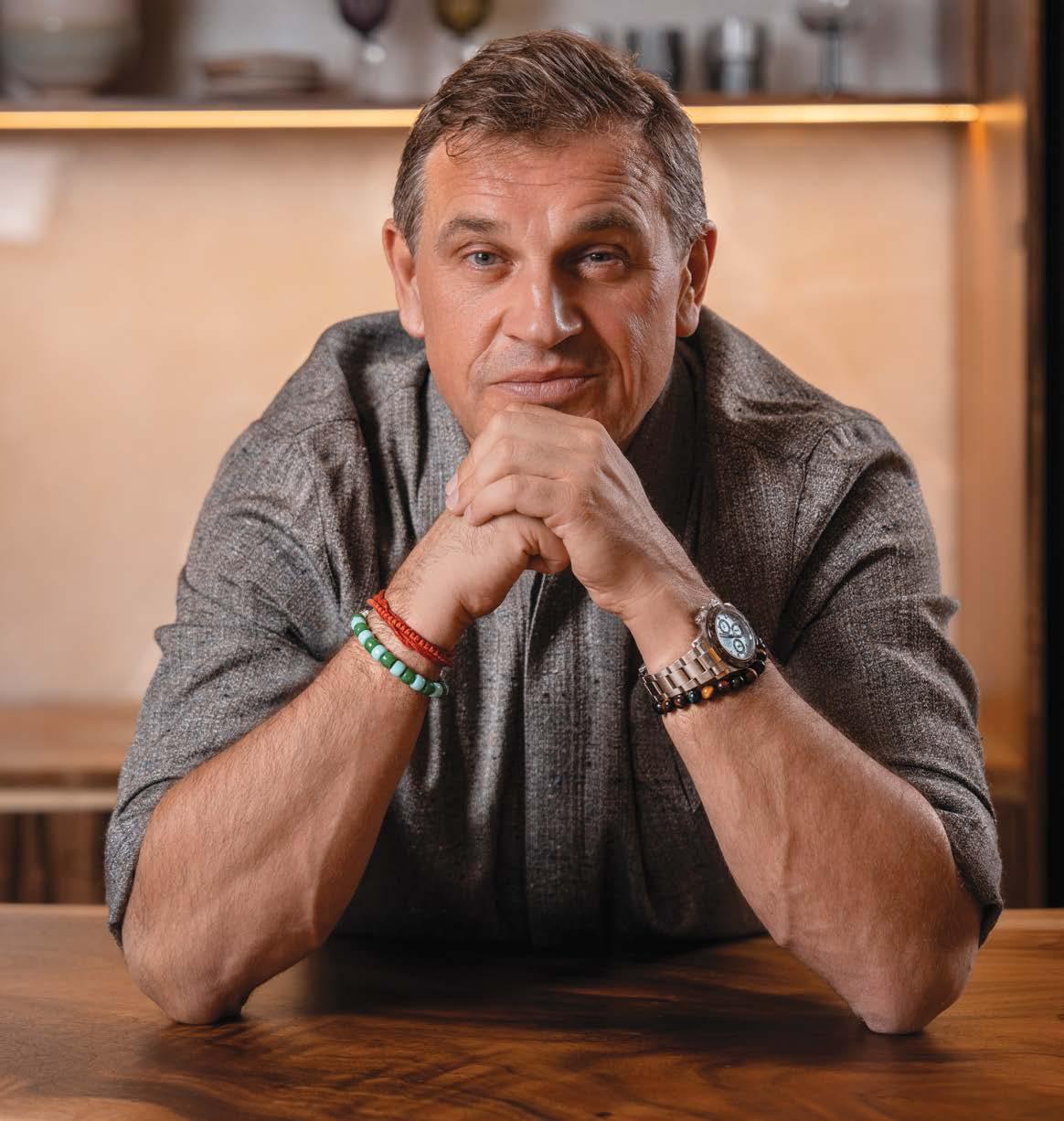
→ Alex Zagrebelny is the founder and CEO of R.Evolution, a high-end boutique real estate developer with offices in Riga, Barcelona, and Dubai.




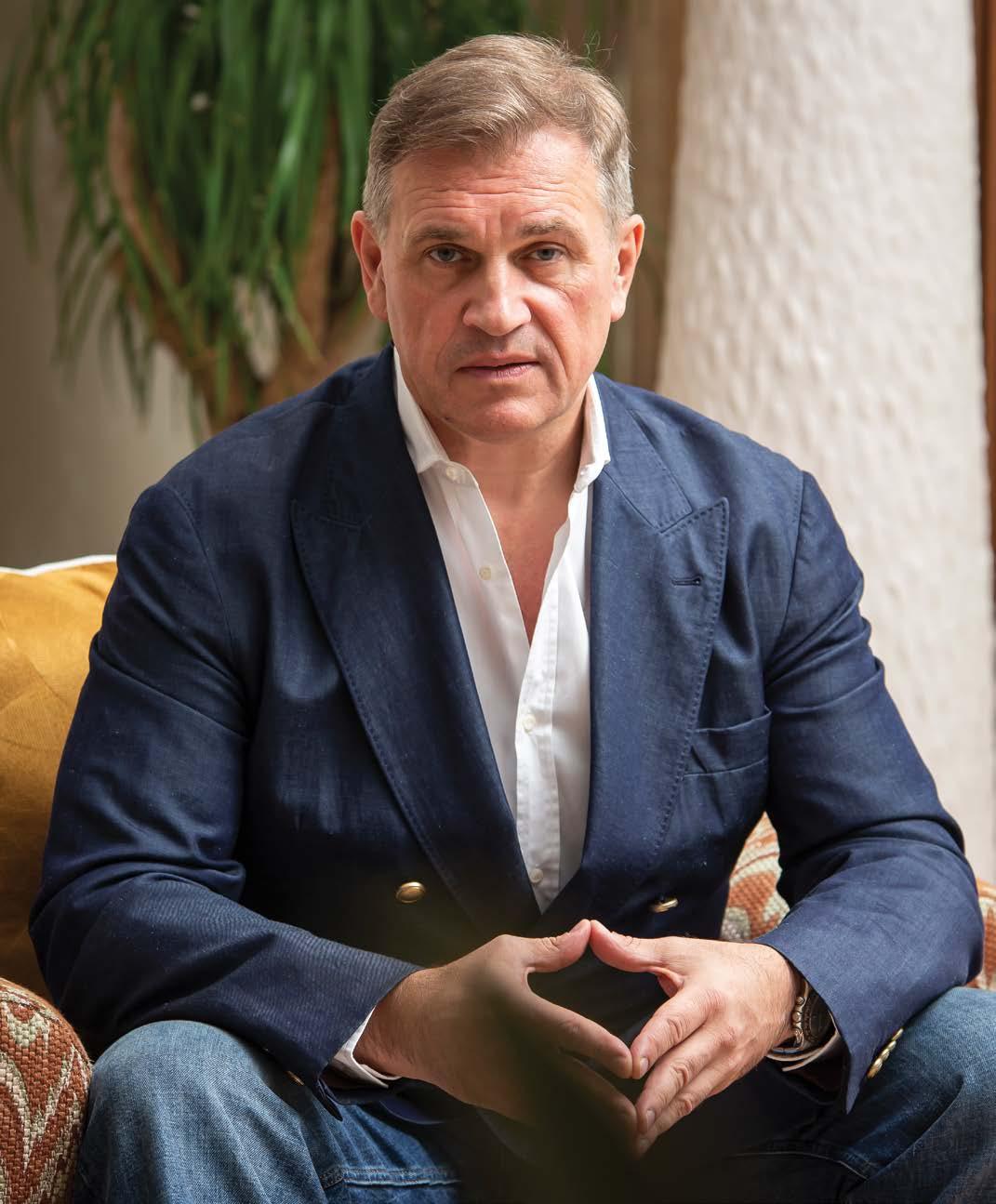
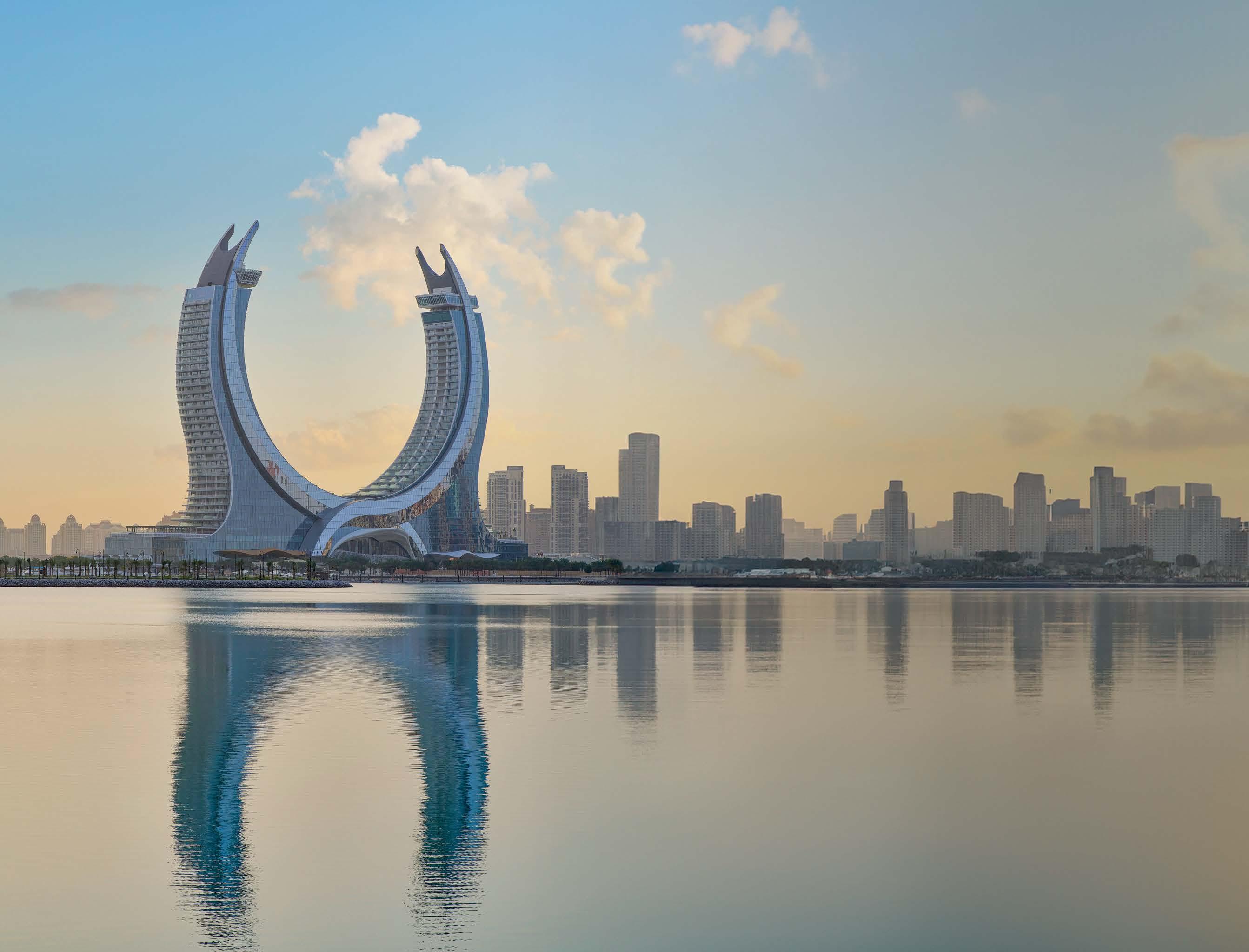
Nestled by the coast of Lusail sits the splendor of Raf es and Fairmont Doha, where luxury is rooted in even the smallest details. Open the doors to mesmerizing hospitality and make memories in a world of sophistication.



Step into a world of opulence when you book a Suite at Raffles Doha.
Experience the added luxury of QAR 750 credit to spend on dining in the hotel, and QAR 500 towards any Spa treatment.
Children aged 12 and below are welcome to indulge in the enchantment of complimentary dining.
Rates starting from QAR 3,500 per night
For reservations, please call +974 4030 7100 or email reservations.doha@raffles.com

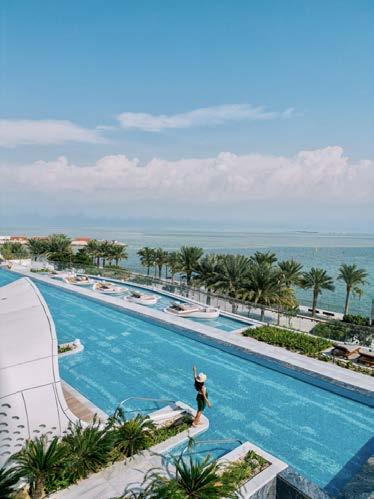




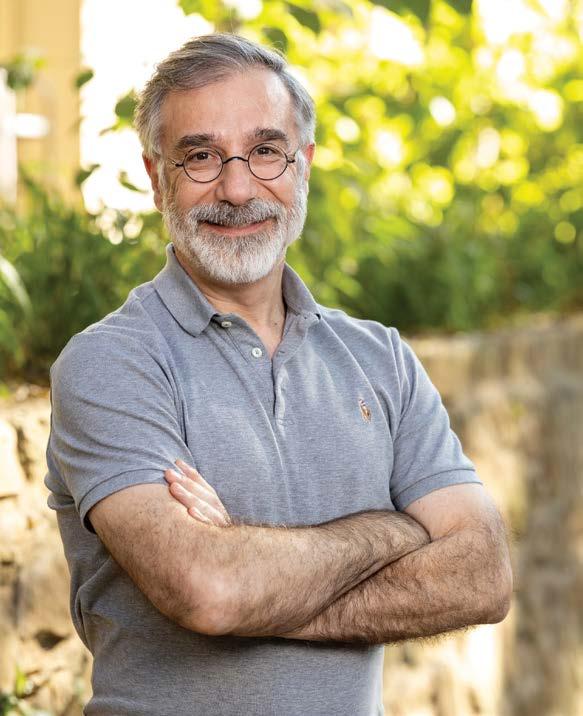
↑ Dr. Samir Khleif is the founder and CEO of Georgiamune, a USheadquartered biotech startup that creates immunotherapy drugs that can treat all types of cancer as well as autoimmune diseases. P.37
54 Building Wealth Young Smart retirement strategies for Millennials and Gen Z.
CEO Wissam Younane wissam@bncpublishing.net
MANAGING DIRECTOR Rabih Najm rabih@bncpublishing.net
ART DIRECTOR Simona El Khoury
MANAGING EDITOR Tamara Pupic tamara@bncpublishing.net
FEATURES EDITOR Aalia Mehreen Ahmed aalia@bncpublishing.net
REGIONAL DIRECTOR
Mahdi Hashemi mahdi@bncpublishing.net
DIRECTOR OF INNOVATION
Sarah Saddouk sarah@bncpublishing.net
GROUP SALES DIRECTOR – B2B GROUP Joaquim D’Costa jo@bncpublishing.net
HEAD OF PARTNERSHIPS
Samir Glor Samir@bncpublishing.net
COMMERCIAL LEAD
Anna Chipala anna@bncpublishing.net
COLUMNIST Tamara Clarke
CONTRIBUTING WRITERS
Fida Chaaban, Husain Makiya, Sophia Bhatti, Dr. Elie Daher and Martin Kubler.
SUBSCRIBE
Contact subscriptions@bncpublishing.net to receive Entrepreneur Middle East every issue
COMMERCIAL ENQUIRIES sales@bncpublishing.net
ENTREPRENEUR.COM Access fresh content daily on our website
EntMagazineME Entrepreneur-me
PO BOX 502511 DUBAI, UAE P +971 4 4200 506

Bringing luxury seaside living to Sharjah for the first time, owners at the Anantara Sharjah Residences enjoy access to the Anantara Sharjah Resort’s world-class amenities, including an infinity pool, five distinctive restaurants, an Anantara Spa and a state-of-the-art gym.
As an investment, owners can enjoy the benefits of a rental management scheme operated by Anantara Hotels, Resorts & Spas, allowing them to maximize their returns when they are not resident in the property.
To register your interest, visit arada.com
LIFE IS A JOURNEY.

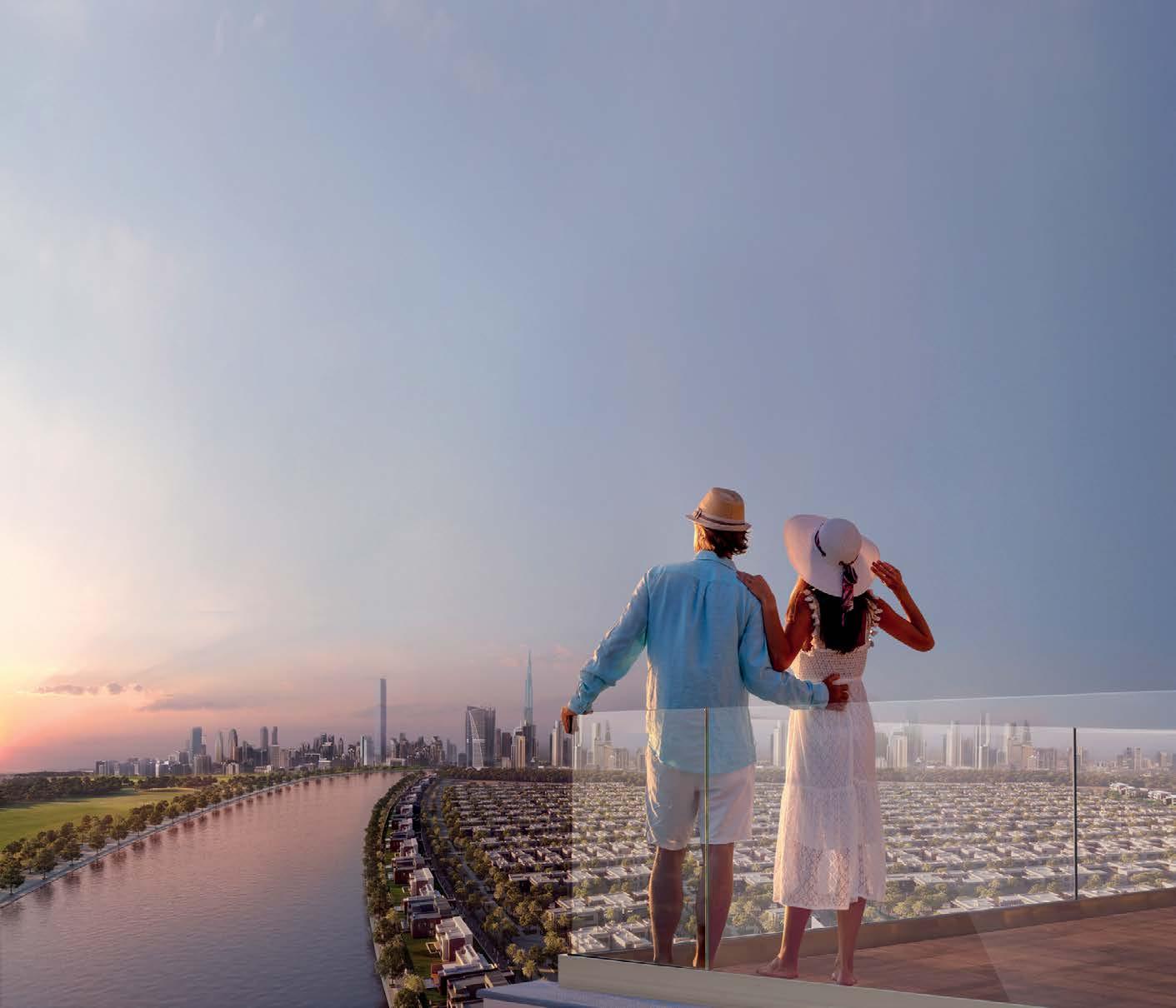




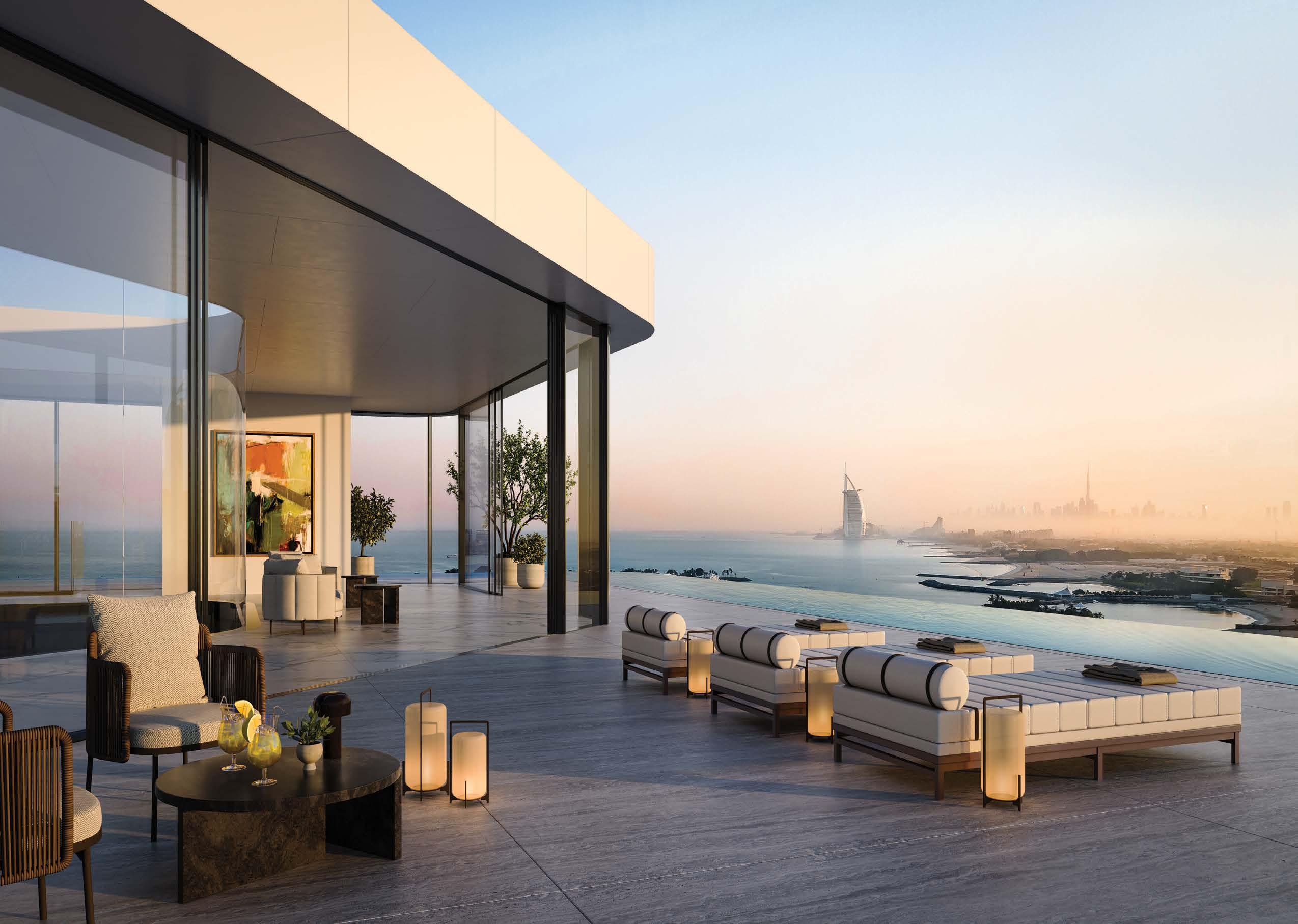

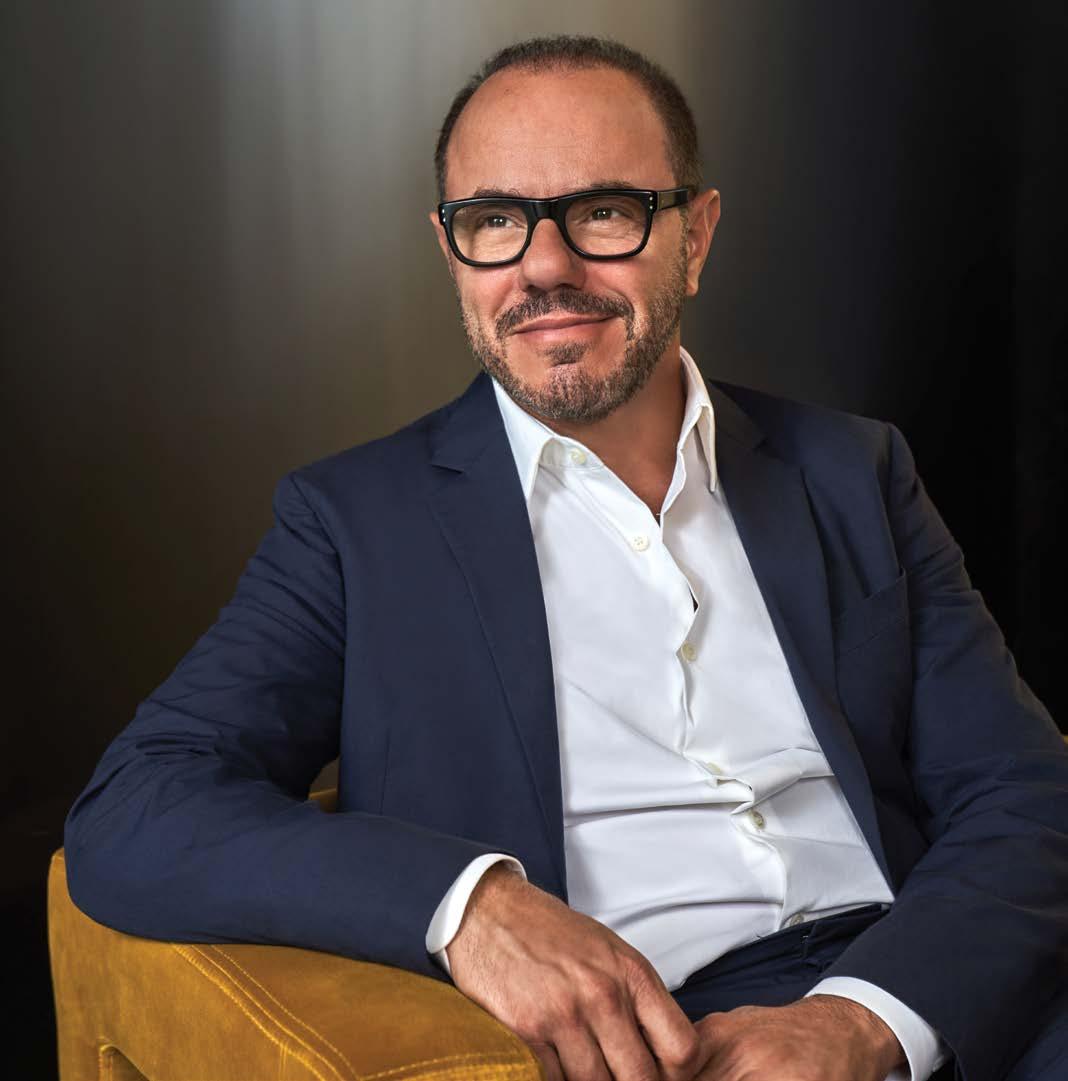
shares his predictions for 2025.
As we step into 2025, several significant trends are poised to shape various industries and sectors. While I can’t predict the future with certainty, I’ve identified key developments that are likely to gain momentum in the coming year, particularly in the realms of real estate, entrepreneurship, hospitality, design, art, and investing. It’s important to note that these observations deliberately exclude any political views or predictions. Additionally, I’ve chosen to omit discussions about artificial intelligence, as its pervasive influence across industries deserves a separate, more focused analysis. Instead, I’ll concentrate on other emerging trends that are reshaping our world in meaningful ways.
Elie Khouri, founder of Vivium, a singlefamily office based in Dubai, is a seasoned marketing expert, investor, and entrepreneur. With over three decades of experience, he has built a reputation for identifying emerging trends and nurturing innovation across industries. Through Vivium, Elie manages a curated portfolio spanning real estate, design, startups, and collectibles. A passionate mentor and advocate for entrepreneurship, he serves as a permanent judge on Shark Tank Dubai. He is also an avid art collector and patron and has been featured among the Top 200 Collectors by ARTnews. In this feature, Khouri highlights the key trends likely to shape industries and society in the coming year.
The MENA venture capital market is set to exceed USD$1.6 billion in 2025, creating unprecedented opportunities for startups and propelled by massive government investments, especially in the UAE and Saudi Arabia. Key sectors to watch include proptech, fintech 2.0 (lending, financing, BNPL schemes, digital banks), and deep tech-driven businesses. Founders should be patient, as exits can be slow, and should focus on building a strong team to attract funding. Investors should consider fund investing over single company in-
vestments and limit VC or startup investments to 10% of their total portfolio. This is driven by the sector’s illiquidity and 7+ year investment horizon.
The entrepreneurial landscape is experiencing a significant shift as young employees, disillusioned by eroding corporate cultures and reduced investment in talent, are increasingly turning to entrepreneurship. This trend
“KEY SECTORS TO WATCH INCLUDE PROPTECH, FINTECH 2.0 (LENDING, FINANCING, BNPL SCHEMES, DIGITAL BANKS), AND DEEP TECH-DRIVEN BUSINESSES.”
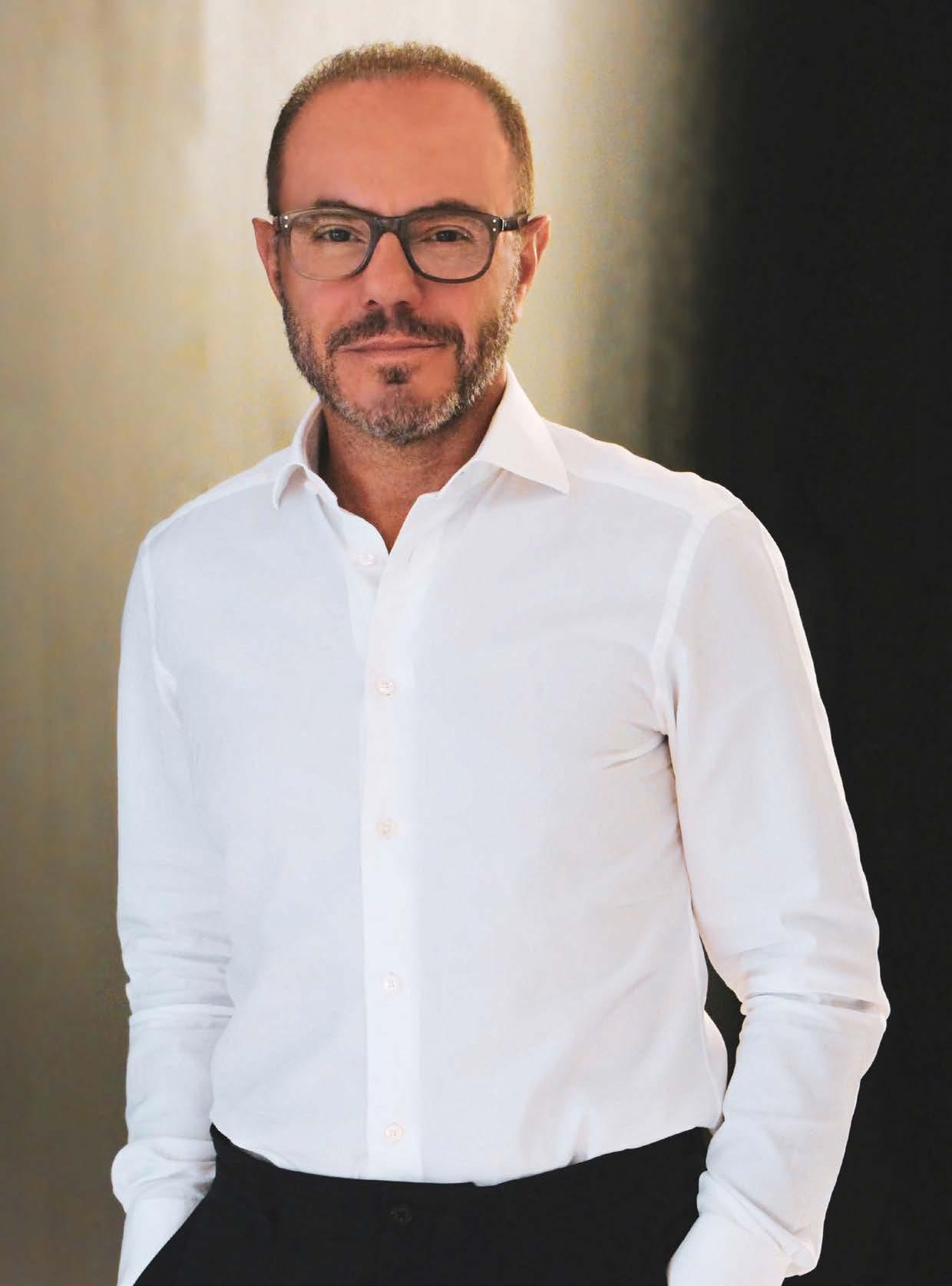
is fueled by increased access to crowdfunding platforms, growing appetite from venture capitalists for early-stage investments, remote work challenges in traditional corporate settings, and cost pressures leading to reduced investment in talent development. As a result, we can expect to see a surge in innovative startups and fresh business ideas driven by this new generation of entrepreneurs.
Many argue that the region lacks cultural depth, but this overlooks the incredible progress made in a relatively short time. The region is still young, yet it is rapidly emerging as a significant player in the global art world, with the UAE, Qatar, and Saudi Arabia leading the charge. Each country is taking a unique approach- Qatar has been a pioneer in building museums and hosting world-class exhibitions but is struggling to create local art engagement and art tourism. Saudi
Arabia is organizing interesting biennales, but the long-term vision remains unclear due to multiple stakeholders. In the UAE, Sharjah’s Biennale has achieved global recognition, Dubai leads in art trade with thriving gallery scenes but unfortunately is lacking serious art institutions, and Abu Dhabi stands out with its clear vision, commitment to art infrastructure, and support for Emirati artists. Abu Dhabi, in particular, is striking the right balance between actions, values, and intent, positioning itself as a cultural influencer in the region.
While the global market will further correct by 5% in 2025, the regional market will grow by +15% but will still represent a modest 0.2% of global. The market is undergoing significant changes, with a shift towards more diverse and inclusive representation. In 2025, we can expect a continued focus on emerging artists from underrepresented
ABU DHABI STANDS OUT WITH ITS CLEAR VISION, COMMITMENT TO ART INFRASTRUCTURE, AND SUPPORT FOR EMIRATI ARTISTS.
backgrounds, increased integration of digital art into traditional art spaces, growing importance of art fairs (especially Abu Dhabi) and online platforms in driving sales, and a stronger emphasis on sustainability and ethical practices in art production and trade. Regionally, the MENA art market is likely to see increased institutional support and private collector engagement.
For those looking to diversify their portfolio with global real estate, consider allocating 10-15% of your total net worth to this sector. Major capitals like Paris, New York, and London offer long-term resilience but primarily for capital preservation. Greece, Spain, and Italy present attractive opportunities due to outpacing GDP growth compared to European peers, unmatched quality of life, and favorable tax policies (e.g., Greece’s 0% inheritance and capital gains tax). For those unable to invest in physical assets, consider ETFs with exposure to these countries or proptech platforms offering fractional investing solutions.
big
Strategies for investing in the UAE real estate market vary depending on investor profiles. For end users, my advice has always been to invest on a need basis, as timing the market is almost impossible and long-term gains are highly plausible with consistent growth of 5-7% expected over the next 5+ years. This is validated by the projected inflow of new residents to the emirates. Yield seekers will find existing assets (never buy off-plan) attractive for long-term capital appreciation, even with potential short-term fluctuations. Yields in the UAE offer 5-8% returns, outpacing the 3% global average. Flippers who seek to invest in properties for delivery post 2026 should exercise caution, as a market correction is
anticipated within 18 months, and when this happens, panicky investors may rush to sell below initial purchase price! The correction will be much less severe though for luxury properties with price points beyond 5,000 AED per sq. foot.
The hospitality sector is undergoing a transformation, with three major trends driving change. First, hotels are leveraging advanced analytics tools to tailor experiences to individual guest preferences, moving beyond simple greetings to more sophisticated personalization. Second, properties are increasingly offering health-centric amenities such as yoga studios, sleep-enhancing rooms, infrared saunas, and holistic meditation practices. These offerings aim to attract health-conscious travelers and enhance overall guest well-being. Third, hotels are incorporating branded F&B outlets as an intrinsic part of their facilities. This strategy serves to attract non-guest visitors, enhance the brand’s lifestyle dimension, and improve overall revenues.
2025 will usher in a new approach to living spaces that seamlessly blend art, furniture, and collectible design. This trend reflects a desire for more engaging and story-rich living environments, the breaking down of traditional boundaries between art and design, an increased focus on curated, personalized spaces that reflect individual tastes and values, and the rise of multi-functional pieces that serve as both art and practical furnishings. This fusion of art and design will create homes that are not just living spaces, but immersive experiences that inspire and nurture creativity.
The luxury fashion market faces challenges in 2025 due to economic uncertainty, geopolitical risks, and potential Trump tariff hikes for European brands. Gen Z and millennials are shaping the landscape, demanding sustainable and ethical products. Brands are focusing on digital innovation, sustainability, and localized strategies to meet these preferences. The rise of the second-hand luxury market, projected to reach over $30 billion in sales by 2025, is influencing sector dynamics. Brands blending tradition with innovation and sustainability are likely to lead. On the corporate side, Kering is expected to continue facing challenges, while LVMH may pursue growth through more acquisitions and increase its stake in Richemont. Hermès, the “scarcity luxury” leader, is anticipated to thrive despite market fluctuations.
FOR THOSE LOOKING TO DIVERSIFY THEIR PORTFOLIO WITH GLOBAL REAL ESTATE, CONSIDER ALLOCATING 1015% OF YOUR TOTAL NET WORTH TO THIS SECTOR. MAJOR CAPITALS LIKE PARIS, NEW YORK, AND LONDON OFFER LONGTERM RESILIENCE BUT PRIMARILY FOR CAPITAL PRESERVATION.”
The luxury market in 2025 will see hyper-personalization become a defining feature of premium experiences. Brands are leveraging advanced data analytics to create tailored interactions that go beyond simple product recommendations. This trend is driven by the growing expectation among consumers for personalized experiences, with over 75% of customers preferring companies that offer such customization. Luxury brands are adopting an advisory role, offering personalized recommendations based on individual preferences and behaviors. For example, Tiffany & Co. provides engraving services to add a personal touch to physical products. Similarly, Ferrari has successfully implemented a personalization program called “Tailor Made,” which allows customers to customize nearly every aspect of their vehicle, from exterior colors to interior materials. This approach has significantly boosted Ferrari’s profitability, with personalization contributing substantially to their revenue growth. This hyper-personalized approach is expected to enhance customer loyalty and drive sales growth in the luxury sector.
FOUNDER AND CEO OF R.EVOLUTION, ON HOW HIS REAL ESTATE DEVELOPMENTS BLEND LUXURY, SUSTAINABILITY AND TOTAL WELLBEING.
by TAMARA PUPIC
→ Alex Zagrebelny is the founder and CEO of R.Evolution, a high-end boutique real estate developer with offices in
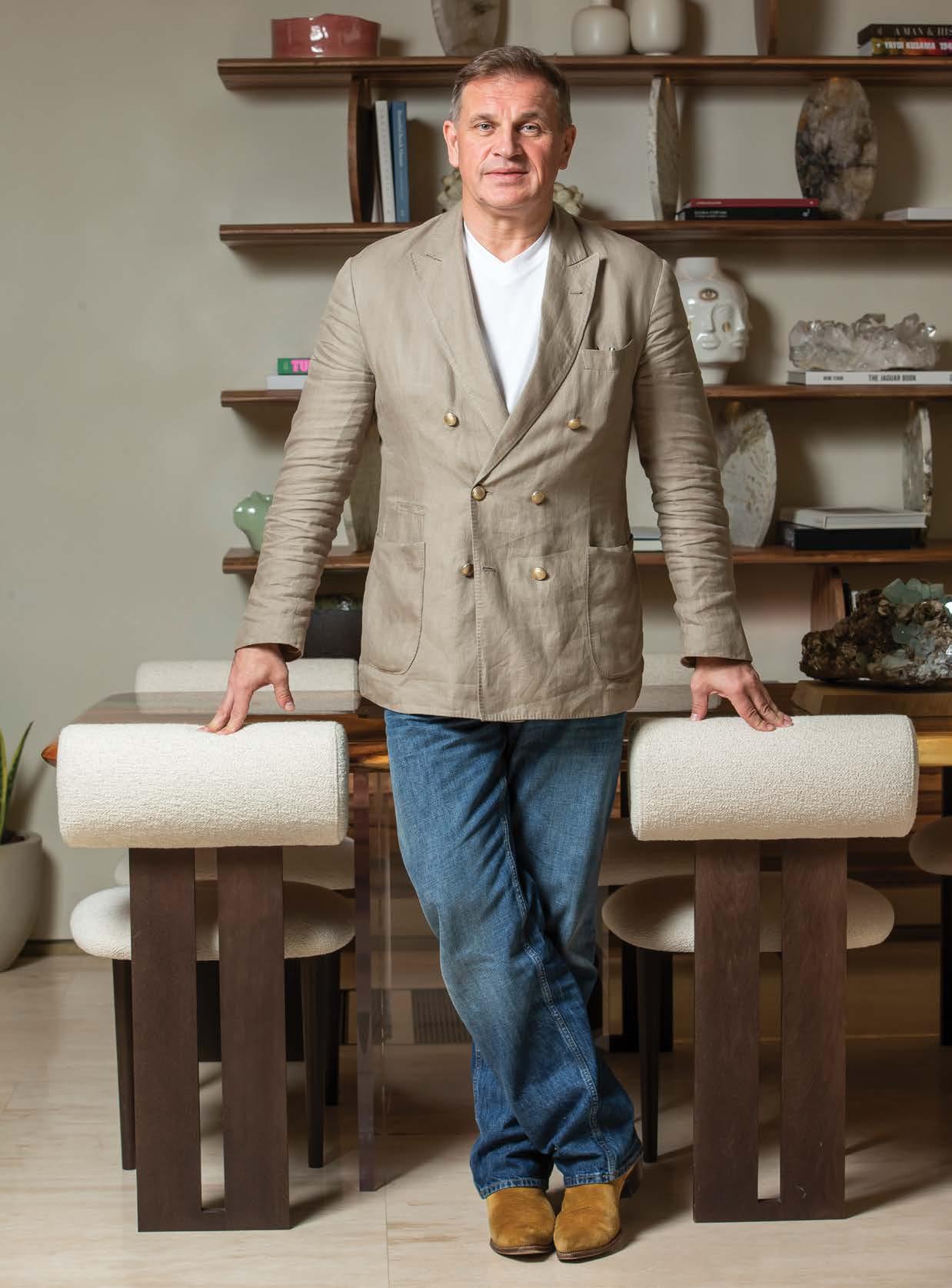
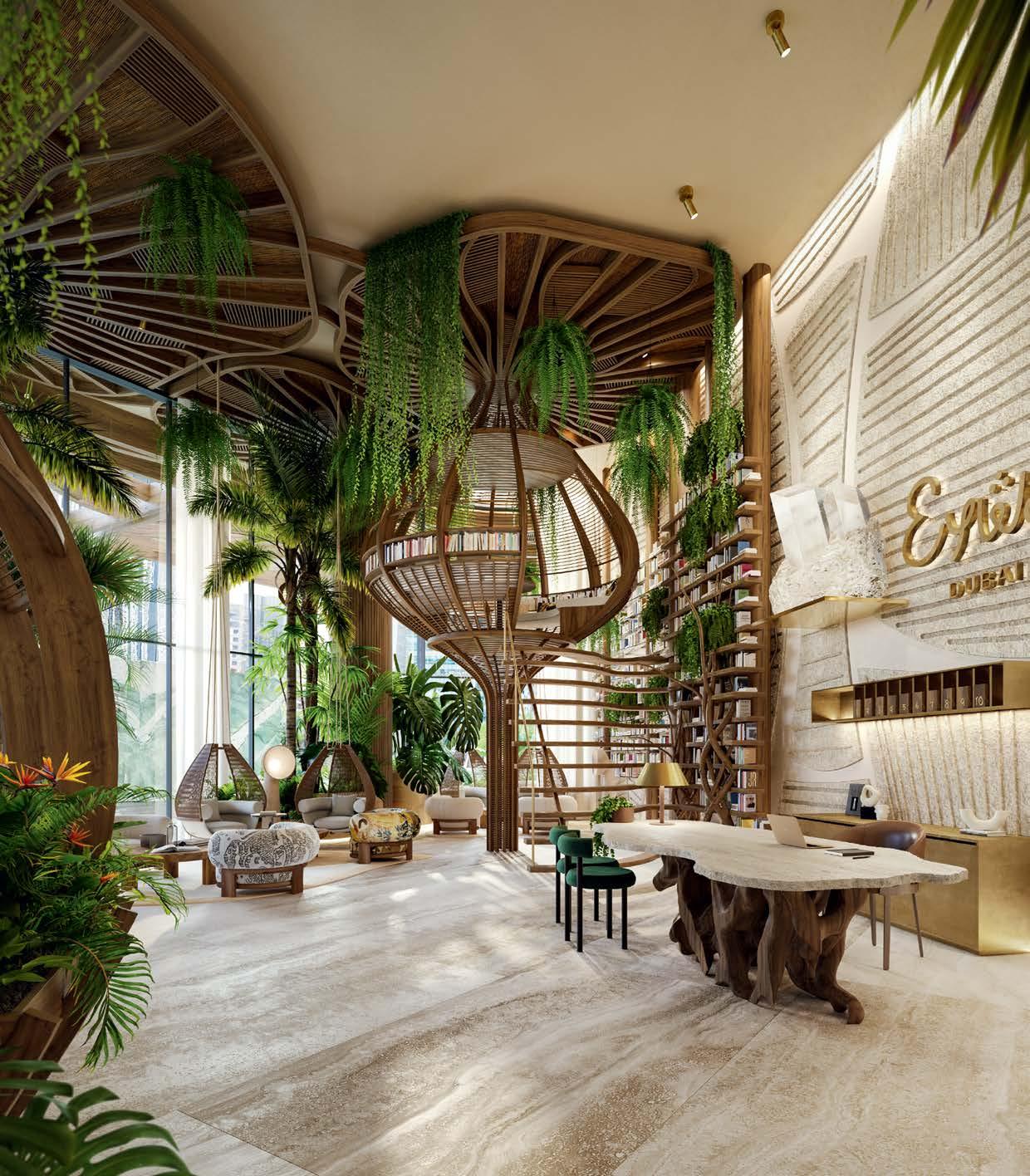
Alex Zagrebelny, founder and CEO of R.Evolution, a high-end boutique real estate developer with offices in Riga, Barcelona, and Dubai, is at the forefront of the real estate wellness sector. As a sub-section of the USD$5.6 trillion global wellness economy, real estate wellness refers to developments that are proactively designed, built, and operated to support the holistic health of their residents, and it is growing at a fast rate- nonprofit Global Wellness Institute (GWI) reports its 18.1% annual growth rate, from $225.2 billion in 2019 to $438.2 billion in 2023. }}
Zagrebelny, however, foresaw this trend long before and spent nearly 25 years piecing together the details of his unique approach to real estate development. “We are a part of the evolution of real estate with a revolutionary view on it,” he says. “The goal of my projects is to show that homes, offices, or spaces where you spend time can change your life. It is important for me that people know that we over-deliver in all our residential, office, or hospitality projects in the sense that we go beyond a beautiful architectural design and think deeply about how our buildings can change one’s life. Ever since I learnt the ancient knowledge of yoga, Ayurveda, Vastu, and other related practices, I decided that all of them must be implemented in the development of real estate.”
Zagrebelny’s masterpiece in Dubai will be Eywa Tree of Life, a 19-floor tower located on the Dubai Water Canal in the Business Bay area of Dubai. Each of its 48 apartments has been designed to appeal to the senses and to promote wellbeing and longevity for its residents. He points out that its sustainability and wellbeing focus starts with his architectural inspiration for the building- the Banyan tree (Tree
of Life) that symbolizes a constantly renewing and reviving ecosystem. He adds, “It also starts with building materials which, we believe, must contribute to improving your health, not doing the opposite. The problem is that today’s cities have lost the connection with nature, and so the poor quality of air and water starts killing people overtime. Or energy inside the buildings is misbalanced. Those are the cases when people start feeling bad inside a building, or start getting ill, and they don’t understand that it is actually because of the environment where they live, sleep, work, etc. We check each material to ensure that it does not create any toxic radicals in the air. We also check the radiation, even in the concrete, because we know that stones from mountains can have high radiation which eventually creates poison inside a building. Then, we have special treatments to protect our buildings from mold and fungi that are poisonous, and so on.”
IT IS IMPORTANT FOR ME THAT PEOPLE KNOW THAT WE OVERDELIVER IN ALL OUR RESIDENTIAL, OFFICE, OR HOSPITALITY PROJECTS IN THE SENSE THAT WE GO BEYOND A BEAUTIFUL ARCHITECTURAL DESIGN AND THINK DEEPLY ABOUT HOW OUR BUILDINGS CAN CHANGE ONE’S LIFE.” “
→ Zagrebelny’s architectural inspiration for Eywa Tree of Life is the Banyan tree (Tree of Life) that symbolizes a constantly renewing and reviving ecosystem.

“
I HAVE CREATED A HOLISTIC SYSTEM, THE EYWA MOVEMENT, THAT HELPS INCREASE YOUR LONGEVITY, YOUR WELL-BEING. IT’S ALL VERY DETAILED, BECAUSE FOR ME, GOD IS IN THE DETAILS.”
Eywa collaborates with the best brands, best architects, and best consultants and uses the latest technologies and most energy efficient solutions to craft a living experience that has a minimum negative impact on the environment and people’s health. All Zagrebelny’s developments have received the highest distinction for sustainability, innovation and advancing human health and wellbeing- the certificates from
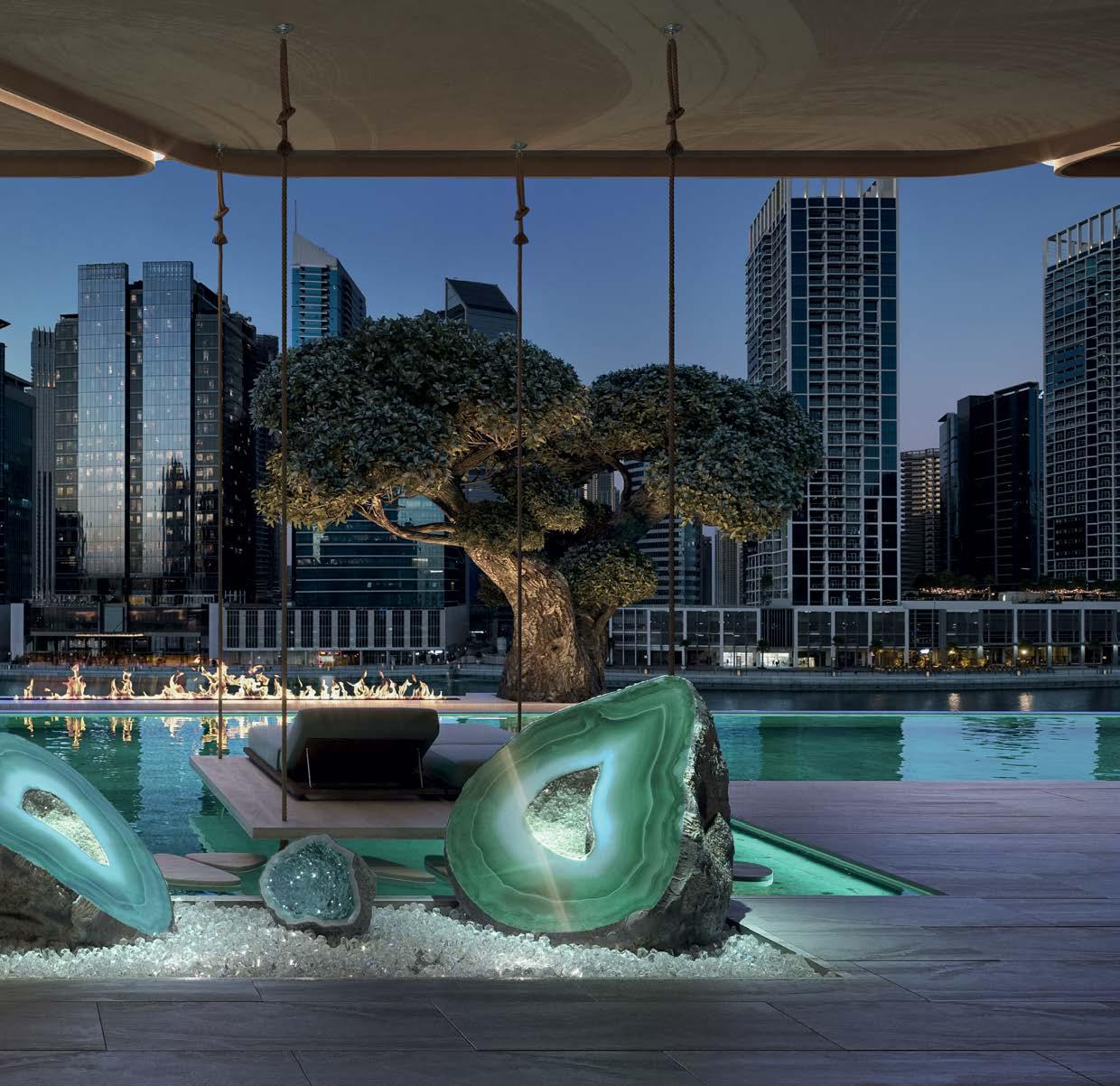
the Leadership in Energy and Environmental Design (LEED) green building program, administered by the International WELL Building Institute (IWBI), and the WELL Building Standard (WELL), developed by the U.S. Green Building Council.
“To achieve this result, we had to think how our buildings could consume
less energy from the Earth than other buildings,” he says. “It leads to clients having to pay less, not too much, but still the overall positive impact on nature is huge. I’m happy that a lot of our clients have started to respect this. The idea is that the building itself is like the Mother Earth, but the mother who is also a knowledgeable
guardian, a guru. I believe that our task, as developers is to be responsible for the quality of our future residents.”
The R.Evolution approach is further developed to unify all six human senses and five elements of nature.
Zagrebelny’s first-of-akind positive energy structure, consisting of
1,450 crystals, geodes and precious stones, is embedded within the building in strategic directions and at strategic locations in order to be in complete alignment with the ancient Indian system of architecture Vaastu Shastra. “I first introduced crystals in a building where I lived with my family and tested it for five }}
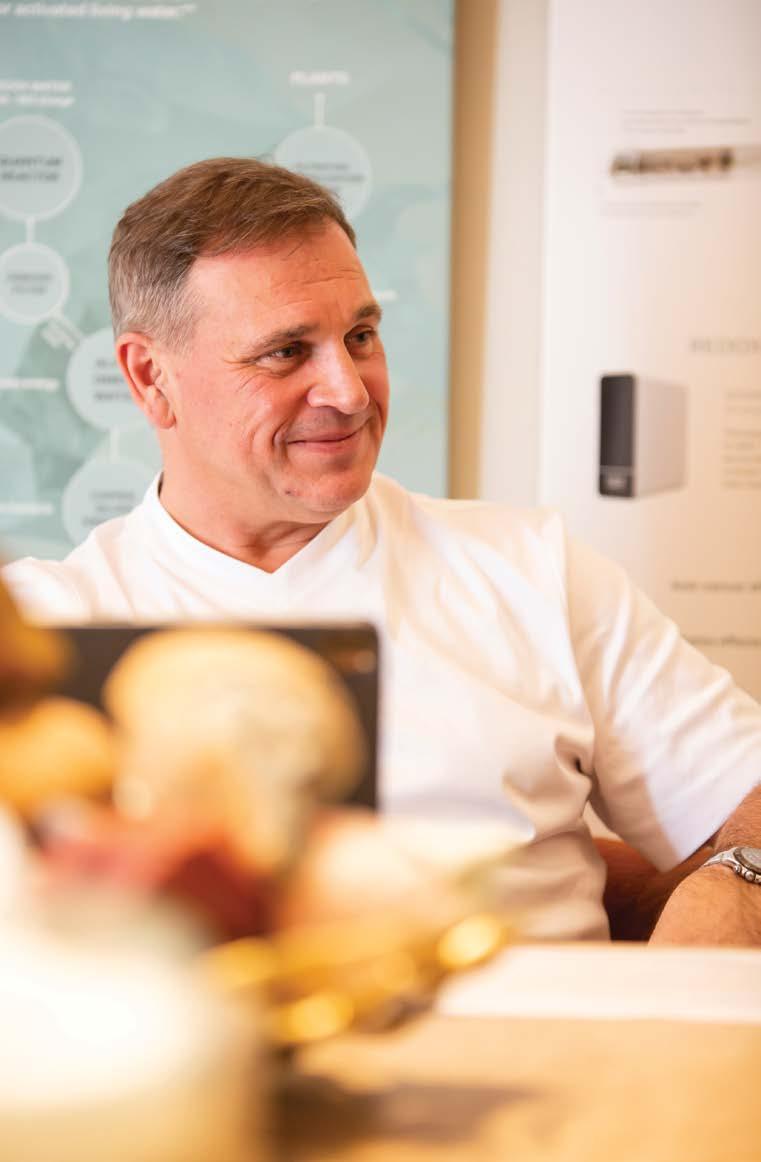
years. In 2019, I decided that the same system will be implemented in all my buildings,” Zagrebelny says.
Eywa will also be an environment where the five elements of nature are celebrated and enhanced. The building will also have its own water system features- special filters and crystals rinse the supply of chemicals, additives and impurities, instead enriching it with beneficial substances and
minerals, raising it to its ideal composition. “It’s not only about filtration, because clean water is like a basic standard, but about ensuring that you get the quality of water that can heal you, so that even water in your home becomes your medicine,” he explains.
For the fire element, the building will have a permanently-lit open fire in the main hall and candle lights throughout its public spaces, while for the air element, it will be
saturated with air thanks to its high ceilings, state-ofthe-art air purification filters, and a speciallyselected, custom-made aroma of natural essential oils. An array of installations throughout the building will highlight the stone and wood elements.
Alex explains that combining five natural elements and six senses into one sacred integrity is aimed at creating a full-fledged sense of space to boost people’s inner sensations and their ability to coherently experience every sense.
“In this way, I have created a holistic system, the Eywa Movement, that helps increase your longevity, your well-being,” Alex says. “It’s all very detailed, because for me, God is in the details. This is why I say that our team and I are not only real estate developers, but magicians and sages at the same time.”
There are also other important features, such as the so-called Apartment No.1 which is a communal space for all residents that includes the Club House, Spa, Gym, show kitchen, dining spaces, private dining/conference rooms and library/ music zone.
“We focus on the community because it indeed is people’s medicine too,” Zagrebelny explains. “Our other offering is a special
→ Eywa Tree of Life is a 19-floor tower located on the Dubai Water Canal in the Business Bay area of Dubai. }}

→ All Zagrebelny’s developments have received the highest distinction for sustainability, innovation and advancing human health and wellbeing
more people to live in my buildings, so I will create something more affordable.”
In achieving these goals, Alex is supported by a team of 45 professionals. “We have a mix of people who have been with us for 15 or 17 years as well as new people who have experience in the UAE local construction industry,” he says. “I call my team real estate
Jedis, because we are actually changing the world and the people’s lives with our creations.”
In addition, his projects in the UAE get the full support from the Riga office of R. Evolution, which is Zagrebelny’s hometown and where he started his career in real estate.
“I’ve been in real estate development for 25 years during which 23

projects were delivered successfully,” he says. “We built a lot in the center of Riga, Jurmala, which is for Riga what Santa Monica is for Los Angeles. In 2014, I started with our second office in Berlin, and in 2018, our third office in Barcelona. Our office in Barcelona is still active. In Berlin, we have finalized all our projects.”
Some of the notable projects in Riga include Legend, super luxury residences in Jurmala; Hoft, a 5 story building, which is a historical monument from 1881, that was transformed into a 7-story modern courtyard building, or Philosophers Residences, a 2-tower residential complex dedicated to the 18th century German philosophers Johann Gottfried Herder and Johann Georg Hamann, who once lived and worked in a house located on the

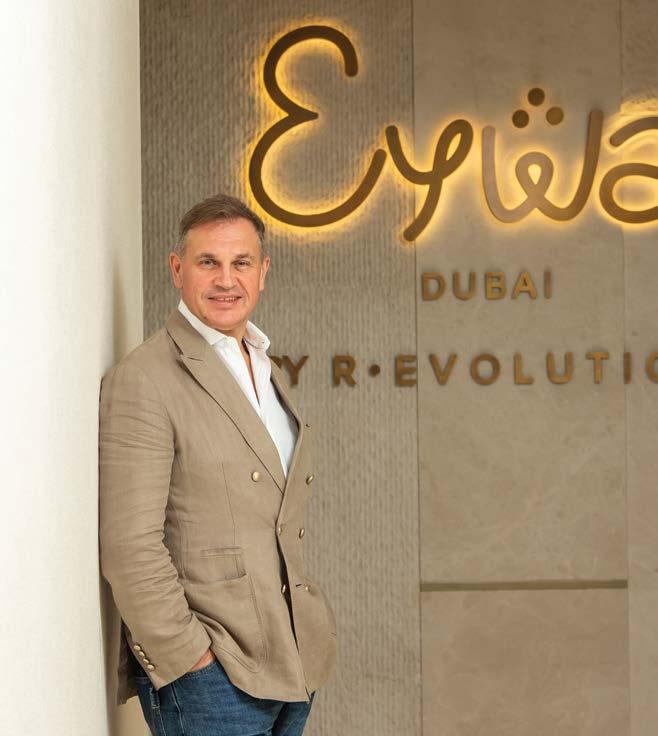
plot. In Barcelona, R.Evolution developed Eywa 22 Palms, a complete transformation of a 1967 building into a safe, environmentally friendly, and modern business centre, and Eywa Bac De Roda, an energy-efficient office centre that is a blend of Catalan cultural values, innovative technologies, and revolutionary architectural solutions.
Zagrebelny believes that architecture is an important component of a city’s image, and from now on, his visionary work will help shape the future identity of Dubai. “I like that in Dubai everyone supports you, especially when they see that you want to create value for the city and its people, and that you will put Dubai on the world map of the most sustainable, wellbeingoriented cities,” Alex concludes.

ANTONY JENKINS 10X BANKING CEO
PIONEERING THE FUTURE OF FINANCE WITH A LEGACY OF CHANGE
by PATRICIA CULLEN
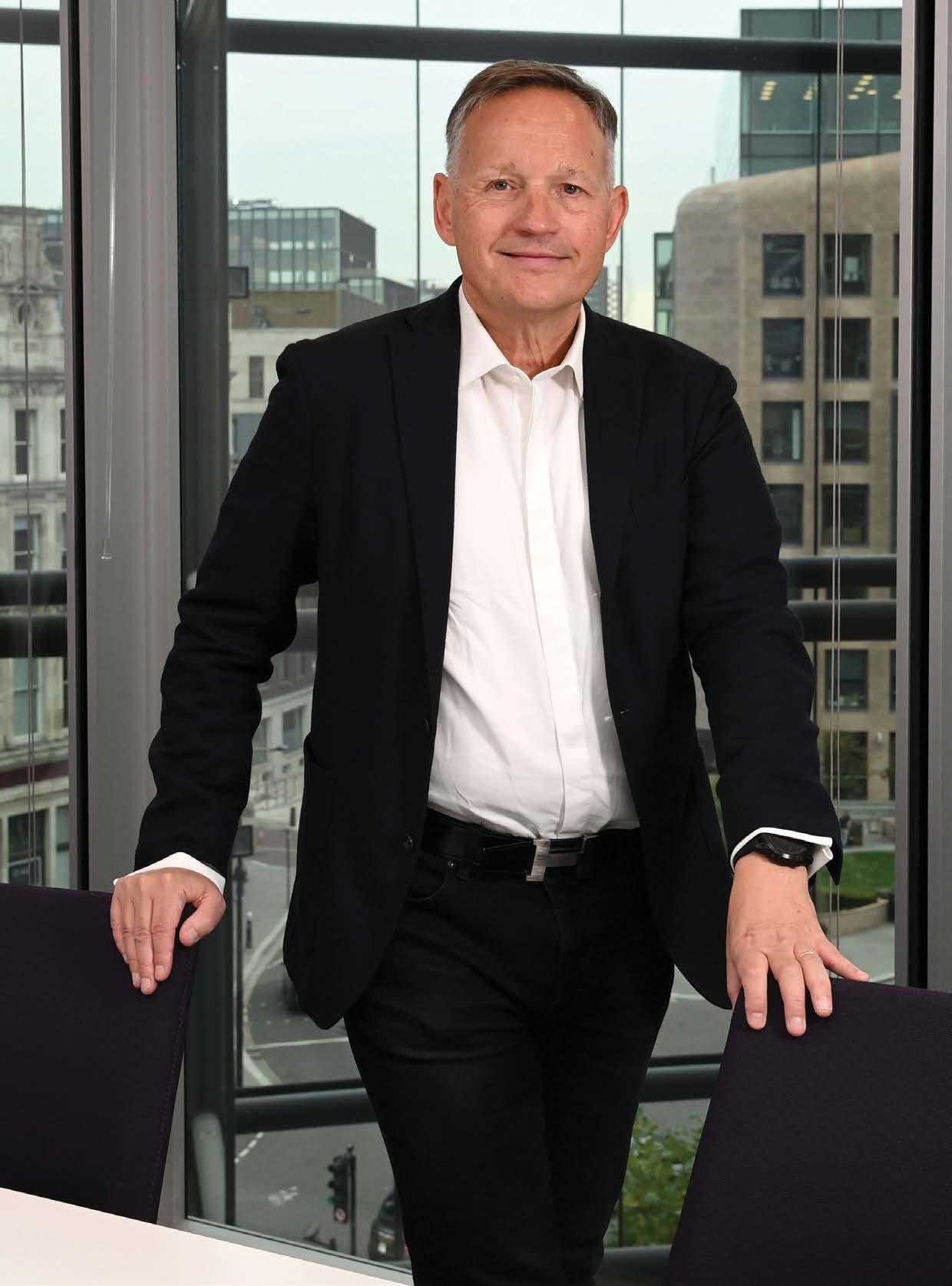

In the ever-evolving landscape of fintech, few stories resonate like that of Antony Jenkins. As the founder of 10x Banking, a company focusedon transforming the banking experience through technology, and former CEO of Barclays, Jenkins’ journey from a stalwart of traditional banking to a trailblazer in financial technology embodies a remarkable pivot. His path offers invaluable insights for aspiring entrepreneurs and established industry leaders alike.
Jenkins’ shift from the corridors of Barclays where he served as CEO from August 2012 until July 2015, to the forefront of fintech wasn’t just a career change - it was a revolution in thinking and highlights a crucial lesson for aspiring entrepreneurs.
“Entrepreneurs really need to think about the world in a different way, “ he says. This mindset shift can unlock new opportunities and drive your journey forward.
Reflecting on his extensive career in the financial services sector, Jenkins emphasises the impact of outdated technology on his impetus to innovate.
“In my previous career, I was continually struck by how poor the technology was,” Jenkins reveals. “It impeded my ability to serve customers, utilise data, and drive down costs effectively.”
This frustration with the limitations of traditional systems inspired his transition to entrepreneurship. For Jenkins, the key to disrupting the financial system lies in understanding the problem, exploring innovative solutions, and aiming for transformative rather than incre-
“WHEN WE TALK ABOUT 10X, WE MEAN MAKING BANKING TEN TIMES BETTER, NOT JUST A LITTLE BIT BETTER.”
mental improvements.
“When we talk about 10x, we mean making banking ten times better, not just a little bit better,” he asserts. “If your solution is only marginally better than existing options, why would anyone choose it?”
Jenkins recognises that transitioning from a high-profile position at Barclays to starting his own venture presented both familiar challenges and new experiences. This transition not only required him to adapt his extensive corporate experience to a more dynamic environment but also demanded a willingness to embrace uncertainty.
“Running any business involves developing a product, creating market fit, acquiring customers, and managing resources,” he notes. “These elements are fundamental whether you’re leading a massive corporation or a small startup.”
However, the agility of a startup presents unique advantages. “In an entrepreneurial company, you have the privilege of moving quickly and adapting constantly,” Jenkins explains. This speed enables rapid experimentation and adaptation, allowing startups to course-correct efficiently. He contrasts this with the slower pace and resource constraints often encountered in large organisations.
Despite these advantages, Jenkins also highlights the intensity of the entrepreneurial journey. “The highs are higher and the lows are lower,” he says. “Building something from scratch can be incredibly rewarding, but the lack of resources at times can make the challenges more daunting.” The constant need to balance limited resources with ambitious goals is a defining aspect of the startup experience.
TO
DRIVE REAL CHANGE, YOU MUST BE WILLING TO DISRUPT YOUR OWN ASSUMPTIONS AND CONSTANTLY SEEK WAYS TO REDEFINE WHAT’S POSSIBLE.”
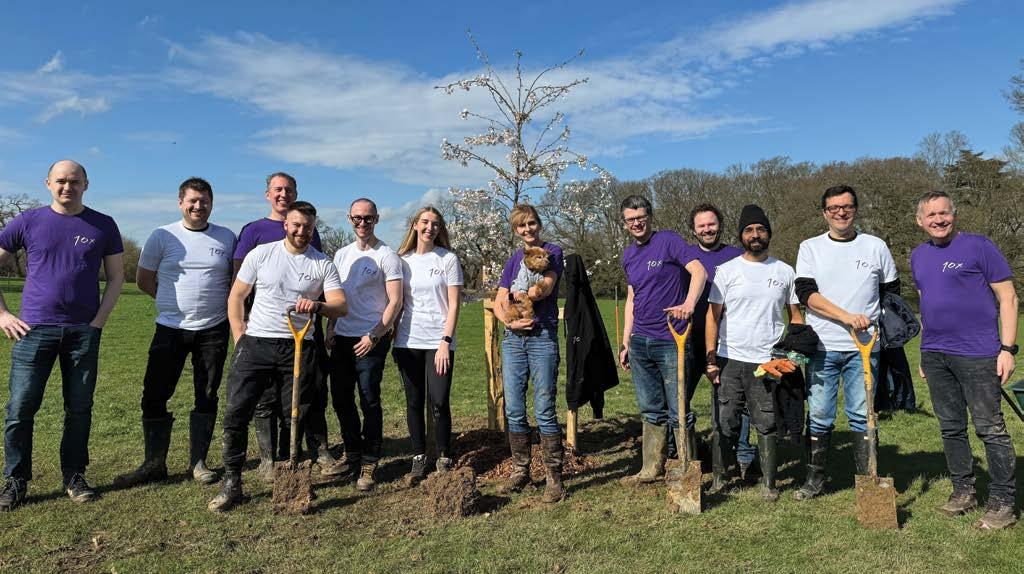
As fintech continues to evolve, Jenkins identifies several key trends that will redefine the financial services industry. He points to advancements in underlying technologies as a primary driver of change.
“The rise of cloud computing and AI has dramatically transformed the landscape,” he observes. “These technologies enable faster development and deployment, making it possible to rethink finance fundamentally.”
Jenkins compares the current era to the dot-com boom of the late nineties, noting how cloud technology has revolutionised the fintech sector. “We no longer need to invest heavily in physical infrastructure,” he
explains. “The cloud provides scalable computing power at a fraction of the cost, which is crucial for innovations like AI.”
He also emphasises the importance of understanding the regulatory and capital-intensive nature of financial services. “Finance is unique in its scale and regulation,” Jenkins notes. “While fintech has seen a surge of consumer-facing businesses, the real transformation will come from rethinking the entire financial system over the next few decades.”
At 10x Banking, Jenkins and his team are focused on leveraging advanced technology to address the evolving needs of financial institu-
tions. “We’ve built tools that allow banks to handle data more effectively and apply AI in real-time,” he says. “Our goal is to empower traditional banks to remain relevant and successful in a rapidly changing world.”
Jenkins emphasises the importance of maintaining a purposedriven approach while scaling the business. “From the beginning, we’ve been committed to making banking ten times better for banks, their customers, and the societies they serve,” he explains. This commitment is underpinned by core values of transformation, integrity, and impact.
His journey illustrates the significance of maintaining core values and purpose while scaling a business. He reflects, “Getting the }}
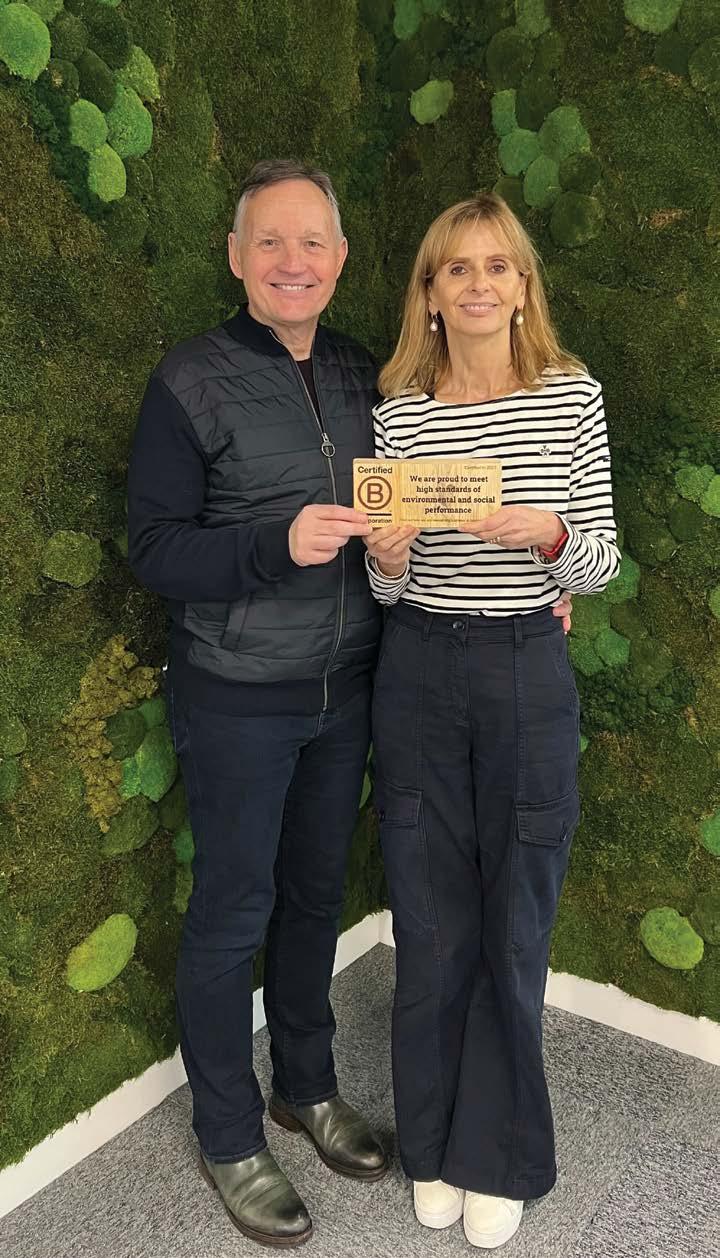
“GETTING THE RIGHT PEOPLE DOING THE RIGHT WORK IN THE RIGHT WAY IS THE HEART OF ANY SUCCESSFUL BUSINESS.”
right people doing the right work in the right way is the heart of any successful business.” This principle, reinforced through his experience at 10x, demonstrates that a steadfast commitment to values and effective talent management are essential for sustainable growth.
As 10x Banking grows, Jenkins acknowledges the challenge of balancing rapid expansion with preserving the company’s culture. “Scaling requires different types of people and processes,” he says. “We continuously reflect on our work, streamline processes, and drive productivity to maintain our ability to deliver effectively.”
One of the key factors contributing to 10x’s success has been its ability to remain nimble despite rapid growth. Jenkins attributes this agility to the company’s strong team and iterative approach.
“We’ve built a powerful organisation that can quickly adapt to new opportunities and technologies,” he notes. “Our team’s ability to execute efficiently has been a major factor in our success.”
In terms of leadership qualities, Jenkins emphasises the importance of seeing the world differently and having the drive to bring innovative solutions to life. “Entrepreneurs need to be visionaries who can conceive new ways of solving problems,” he explains. “This requires a combination of creativity, resilience, and the ability to stay calm under pressure.”
For example, Jenkins admires Steve Jobs for his ability to connect technology with human needs. “Jobs didn’t just create technology; he made it relevant to people’s lives,” he says. “His vision and commitment to improving user experiences exemplify the impact that visionary entrepreneurs can have.”
When asked about unconventional decisions, Jenkins highlights the entire venture of founding 10x Banking as a significant and unconventional choice. “Starting a fintech company with my background was a bold move,” he reflects. “I’ve been fortunate to have the resources and experience to make it happen.”
Looking ahead, Jenkins is focused on scaling 10x Banking and expanding its global reach. “We have a strong pipeline and are dedicated to leveraging our technology to solve critical problems for banks,” he concludes. “Our mission is to continue pushing forward and making a positive impact on the financial industry.”
Jenkins’ journey from traditional banking to fintech innovation underscores the transformative power of technology and visionary leadership. As 10x Banking continues to redefine banking, Jenkins remains committed to his mission of making financial services ten times better for everyone involved. His approach underscores that the essence of entrepreneurship lies in challenging the status quo and transforming industries through groundbreaking solutions. Jenkins encapsulates this ethos succinctly, stating, “To drive real change, you must be willing to disrupt your own assumptions and constantly seek ways to redefine what’s possible.”
OUR TEAM’S ABILITY TO EXECUTE EFFICIENTLY HAS BEEN A MAJOR FACTOR IN OUR SUCCESS.”
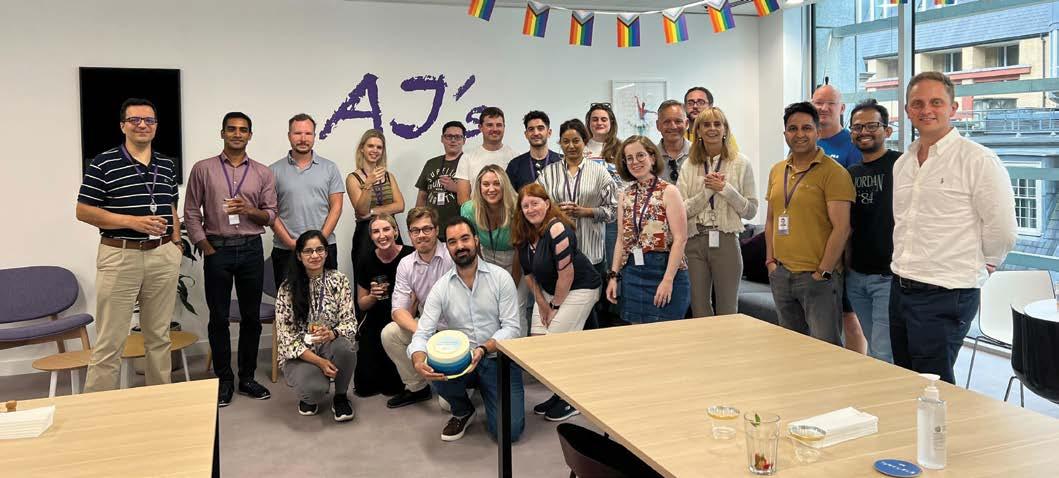
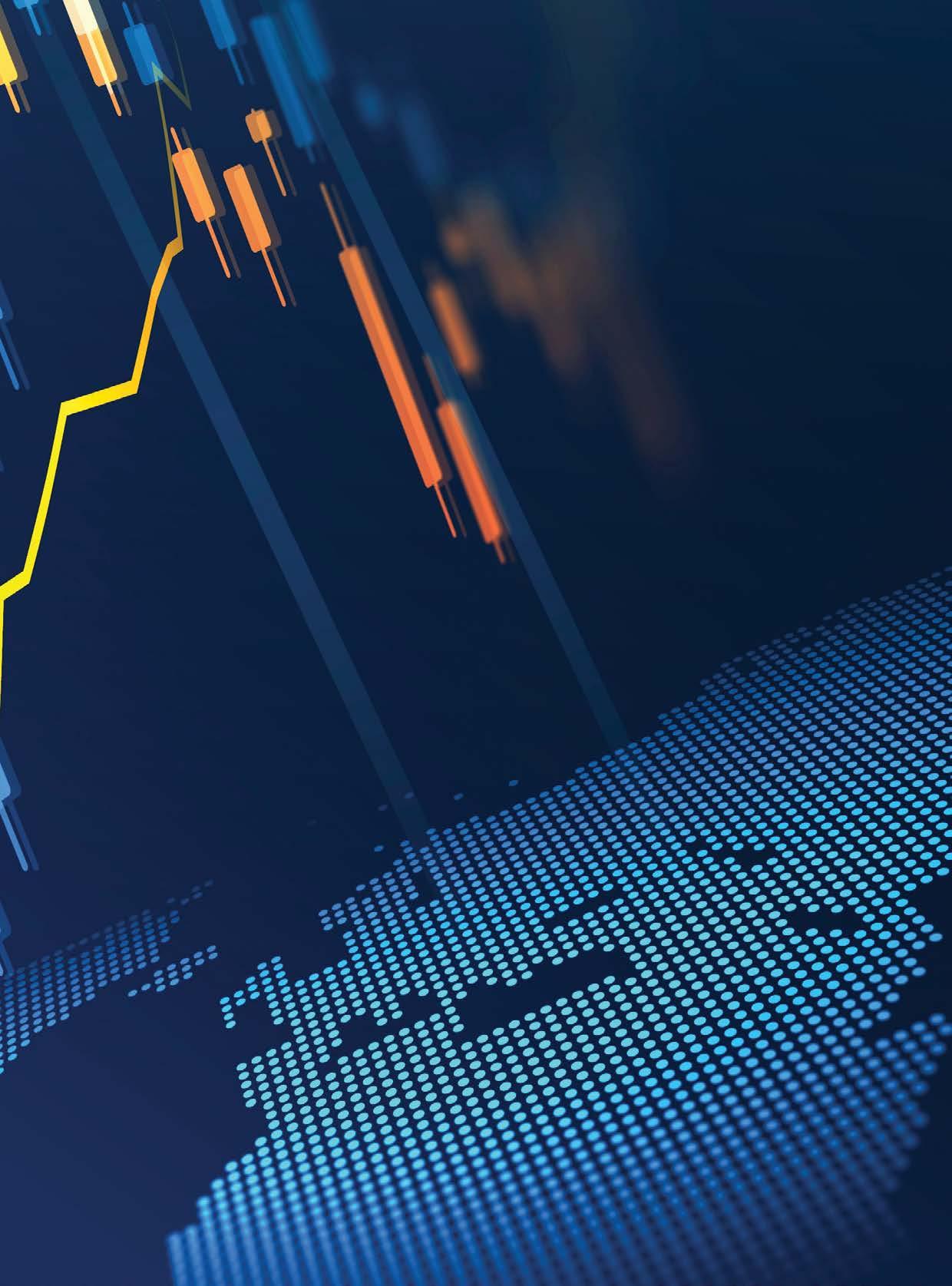

Born in the US, and aided by the support of the Qatar Foundation’s Arab Global Scholars Program, Georgiamune aims to unlock the full potential of cancer immunotherapy- and at the helm of this mission is
The idea at the time was: is it possible to develop therapies that employ our immune systems to fight cancer?” recalls Dr. Samir Khleif when speaking about his time at the US-based National Cancer Institute (NCI)- a tenure that would eventually last a little over 15 years, from 1996 to 2012, and later lay the foundation for his US-based biotech startup Georgiamune. “When I was undergoing my oncology training at the NCI, which is part of the National Institutes of Health in the USA, there was an emerging field of study at the time called immunotherapy, which focuses on understanding how the immune system fights infections and utilizes it to fight cancer,” Dr. Khleif continues. “We have known for a long time that our immune system is designed to discover and fight foreign invaders in our bodies, including viruses and bacteria. In a way, cancer is a foreign invader because it develops based on many mutations in our normal proteins. So, the idea then was to explore if it was possible to educate the immune system to identify tumors as a foreign invader.”
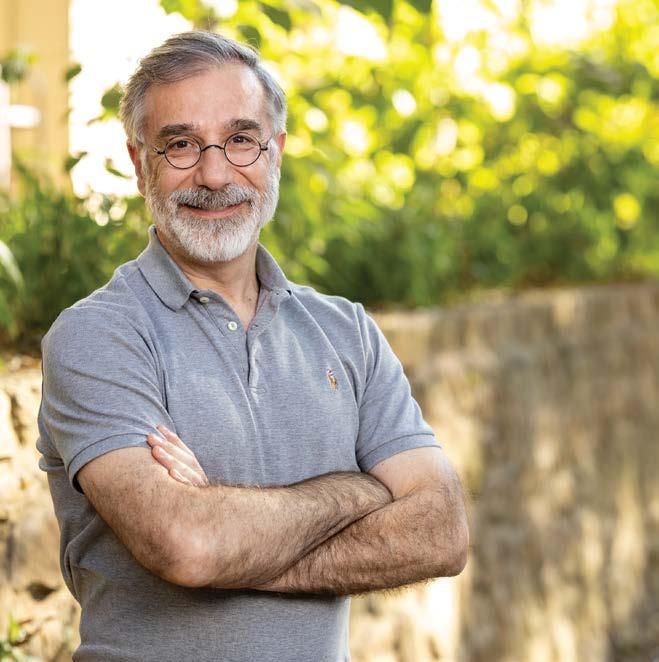
↑ Dr. Samir Khleif is the founder and CEO of Georgiamune, a US-headquartered biotech startup that creates immunotherapy drugs that can treat all types of cancer as well as autoimmune diseases.
} Over time, Dr. Khleif -who introduces himself as “a physician, a medical oncologist, and a scientist”- decided that studying how the immune system works against cancers developed by viruses could help in developing therapies to help it fight other cancers as well. “One of the advantages of being both a physician and a scientist is that
when you think about science, you think of its clinical applications and how it can help patients and cure diseases,” he says. “As such, when I got interested in immunology, I started working as a researcher and a physician in the field of immunotherapy. Throughout my years working at the National Institutes of Health and afterwards as director of the
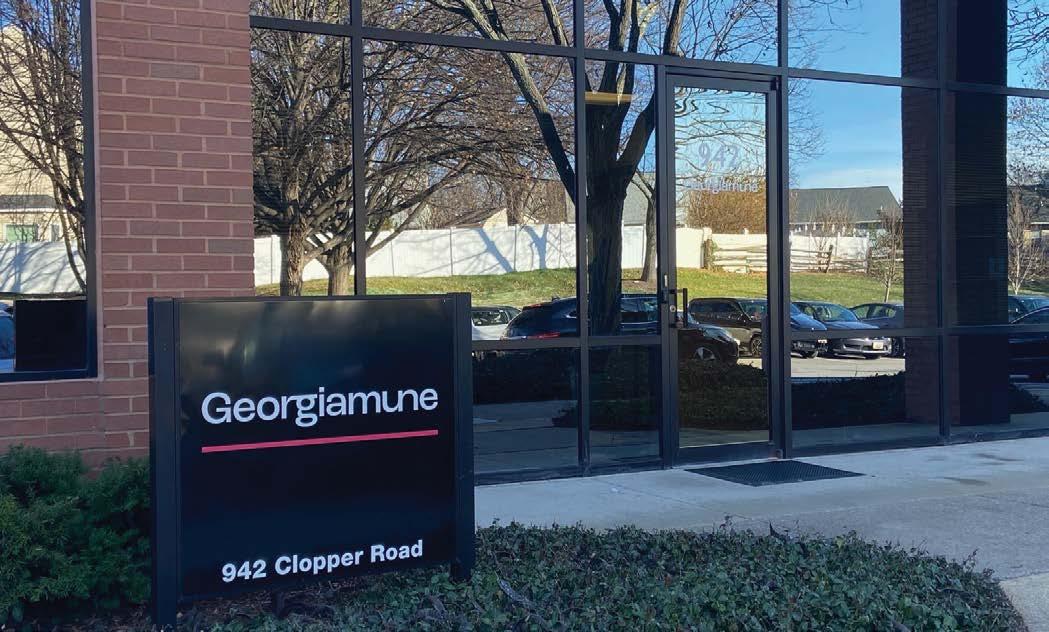
Georgia Cancer Center at Augusta University, I conducted extensive research to further our understanding of the immune system and how we can implement it to fight cancer. Overall, I managed to secure almost 100 patents issued or pending in the field of immunotherapy and cancer research. With that I realized that the best way to utilize these patents and translate my research into therapies that could benefit cancer patients was to take the bull by the horns and start my own biotechnology company. This way, I would be able to utilize these patents, rather than leave it entirely to universities that usually are not able to commercialize these intellectual properties as effectively. So that’s how it happened…”
} Indeed, it was following the above series of events that Georgiamune was officially launched in 2018 in the American city of Gaithersburg. It was Dr. Khleif’s time at Georgia Cancer Center that, in fact, lent itself to the startup’s very name. “It’s unusual but rather memorable, which is important,” the founder adds with a smile. “Since we started the company four and a half years ago, we have been making new fundamental biological discoveries. We now have over 250 patents issued and pending based on
our work. So far, we were able to develop 11 drugs for cancer and autoimmune diseases; three drugs are already undergoing clinical trials and we are in the process of developing more. Georgiamune is a very disruptive company in the biotechnology space, we are changing the understanding of how our immune system works and how it fights cancer and autoimmune diseases in unprecedented ways. I’m hoping that this will disrupt the whole therapeutic approach to cancer and autoimmune diseases, and that we can have a positive impact on the lives of our patients and on patient care, in general.”
} Now, one needn’t delve into extensive research to understand the mammoth role Georgiomune could play in the fight against cancer. A February 2024 report by the World Health Organization showed that about one in five people develop cancer in their lifetime, while “approximately one in nine men and one in 12 women die from the disease.” The report presents another worrying statistic: over 35 million new cancer cases are predicted in 2050, which is a 77% increase from the estimated 20 million cases in 2022 alone. In the absence of efficient cancer treatment, Georgiamune’s promise of effective immunotherapy emerges as quite the beacon of hope.
} “While immunotherapy actually led to the cure of many patients that were not able to be treated with traditional methods, like chemotherapy, radiation therapy, or surgery,
just 20 years ago, it also addressed one of the most horrible aspects of treatment for cancer patients- the side effects.,” Dr. Khleif elaborates. “Compared to other standard cancer therapies, immunotherapy does not cause some of the side effects such as decreased immunity, hair loss, and other symptoms. However, despite the revolution that immunotherapy led to in patient care, it has only worked for 15% of cancer patients. The remaining 85% still do not benefit from immunotherapy. So, what we’re trying to do at Georgiamune is disrupt the field by advancing our understanding of the immune system and open new doors in how we treat cancer and develop novel drugs that can help the other 85% of patients that cannot benefit from currently available immunotherapy treatments.”
}Now, while cancer treatment remains a key point of focus for Dr. Khleif and his team, the Georgiamune services are also catered towards another major healthrelated area: autoimmune diseases. “Many autoimmune diseases are incurable or do not have effective therapies,” Dr. Khleif adds. “Type 1 diabetes is an example, which we don’t have effective treatments for besides giving insulin. So, the question is, can we develop drugs that could also treat these diseases
WE HAVE KNOWN FOR A LONG TIME THAT OUR IMMUNE SYSTEM IS DESIGNED TO DISCOVER AND FIGHT FOREIGN INVADERS IN OUR BODIES, INCLUDING VIRUSES AND BACTERIA…. SO, THE IDEA THEN WAS TO EXPLORE IF IT WAS POSSIBLE TO EDUCATE THE IMMUNE SYSTEM TO IDENTIFY TUMORS AS A FOREIGN INVADER.”
based on our new understanding of the immune system that we are building upon at Georgiamune? Born out of this understanding is the idea of immune system reprogramming.”
}Dr. Khleif then adds that the reason for targeting these two medical areas is due to a common factor between them. “In both cancer and autoimmune diseases, our immune system does not function well,” he explains. “In cancer the immune system is underperforming, mainly because cancer suppresses the immune system, which leads to cancer evading the immune response. As for autoimmune diseases, it is abnormally over activated which leads to attacking our own normal tissues. Based on our new discoveries of how the immune system functions
and how it fights disease, can we reprogram the immune cells and in particular, our T-cells to increase their activity and get them to supersede the suppressive mechanisms of cancer cells. This would make them more compatible to fight cancer. As for autoimmune diseases, the reprogramming would dampen down the over-active immune system and turn it back to the normal state.”
} Already, Georgiamune has three drugs undergoing clinical trials- two for cancer and one for autoimmune diseases. ”These are all in very early stages and therefore have no available data at this stage- it’s in progress, and as you know clinical trials take time for data to come out and we hope to start having some in the near future,” Dr. Khleif reveals.
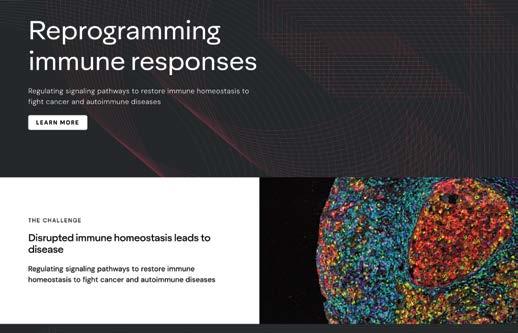
“Drug development is not a fast process, because you need to pass multiple phases of clinical trials. Only after that can drugs be approved- this usually takes years.”
} As patients and healthcare institutions and stakeholders thus await the release of Gorgiamune’s novel drugs that aim to re-establish immune balance, Dr. Khleif shares that the final product will be effective against any type of cancer. “The type of cancer is irrelevantwhether it’s colon cancer, lung cancer, or breast cancer, these therapies could work across different types of cancers,” he explains. “It is the biology of that particular cancer that matters. As mentioned earlier, cancer patients have a suppressed immune system for many reasons, one important reason is that cancer cells develop many strategies to inhibit our immune system so they can develop into cancer. This is what we are trying to change and overcomeso the immune system works as it should. Based on that, immunotherapy and the reprogramming of those immune cells could eventually mirror existing immunotherapies that are effective across different diseases.”
DESPITE THE REVOLUTION THAT IMMUNOTHERAPY LED TO IN PATIENT CARE, IT HAS ONLY WORKED FOR 15% OF CANCER PATIENTS. THE REMAINING 85% STILL DO NOT BENEFIT FROM IMMUNOTHERAPY. SO, WHAT WE’RE TRYING TO DO AT GEORGIAMUNE IS DISRUPT THE FIELD BY ADVANCING OUR UNDERSTANDING OF THE IMMUNE SYSTEM.”
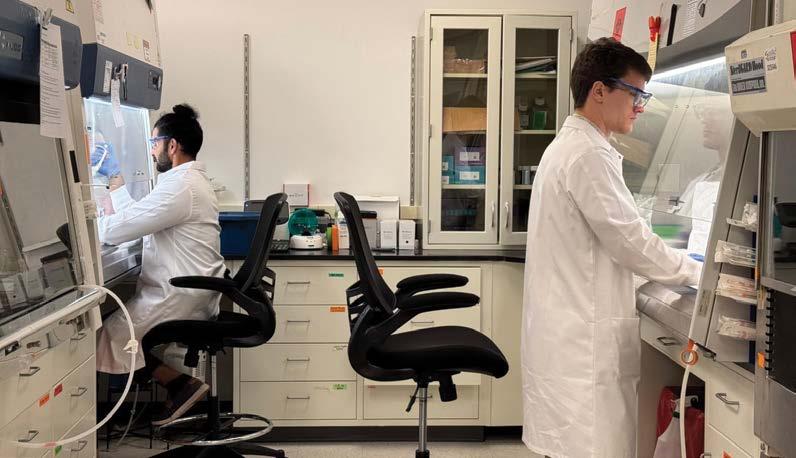
} Having already completed a successful Series
A round, the startup has also managed to capture the interest and support of investors along the way.
“All the funding so far has come from top-tier institutional investors and blue-chip capital funds specializing in biotechnology,” Dr. Khleif says.
“Investors’ reaction to our company’s work and growth has been extremely positive. We were one of the few biotechnology companies able to raise substantial funds in 2023, which was a challenging year for biotech fundraising overall. We had to significantly upsize and increase our Series A raise target because of the high interest from investors. In the end, we secured more
than double our original goal.”
} In the midst of such business-related milestones, the startup also partook in the Arab Global Scholars program- an online community, helmed by the education and research non-profit organization Qatar Foundation, that fosters innovation-focused connections among Arab scholars, innovators, researchers, and scientists. The program -a celebration of Arab-led contributions to the global science, technology, engineering and mathematics (STEM) field- has thus enabled Dr. Khleif to introduce Georgiamune to Qatar and the wider region. “The Arab Global Scholars
gathering in Qatar was very interesting and productive,” he notes. “I did not know what to expect, but I found major takeaways. One was the opportunity to meet like-minded scientists and entrepreneurs that are interested in the development of cutting-edge industries or cutting-edge technologies within their industries. The second thing is that there is a tremendous opportunity in the region for the development of such industries. From my discussions I found that Qatar and Qatar Foundation are extremely serious in their commitment to the development of the biotechnology industry. Also, the time is right. Because if you look at the
map of where biotech hubs exist in the world, the MENA region is kind of a desert. This presents an opportunity, particularly now with the advancement of biotechnology and supporting technologies, including artificial intelligence (AI).”
} And while his time at Arab Global Scholars introduced Dr. Khleif to the region’s many opportunities and advancements, it has also allowed him to more closely observe the areas that could do with refurbishments. “Unfortunately, at this stage, the biotechnology presence in the MENA region is still low and there are not too many players in this field,” the founder says. “There is a lot of advanced and transformative science coming from the academic institutions, but developing an infrastructure that can support the translation of such discoveries into a biotechnology industry is involved and requires multiple factors to exist. It takes human resources. Not just scientists, but also experts that know how to translate that science into biotech innovations and commercialization. That is a major field of expertise that currently is not significantly available in the region. The development of biotechnology supporting infrastructure, such as high-quality manufacturing facilities and a biotech informed funding apparatus, are two more important factors. As such, we must establish
funds to develop those ideas from their academic incubation and turn them into biotech companies. These funds will need to be substantial, as companies in this industry usually need hundreds of millions of dollars that is usually from public and private sources that are specialized biotechnology.”
} For his endeavors in not just attempting to create what could be a major healthcare breakthrough, but also efficiently leading his business, Dr. Khleif was chosen as one of the winners of the annual Entrepreneur of the Year award by global professional services provider EY. “It’s always great for people to recognize the hard work that you have done, but importantly this is an award that recognizes the whole team, because the amazing talented team of scientists, clinicians and operation that surrounds me is what makes great things happen and wonderful ideas develop into reality,” Dr. Khleif says. “These awards always help to keep a person motivated and demonstrate that you are on the right path. I’m hoping this achievement would help Georgiamune and its great team to continue development of better drugs that are presently incurable that enable us to help patients and human beings around the world in overcoming those diseases.”
} At this point, one may certainly wonder how the founder has been able to balance between his role as a scientist and a startup founder without fumbling either of the two responsibilities. “Resilience, resilience, and resilience!” Dr. Khleif replies. “As any entrepreneur will tell you, the journey of building an organization or a company from the ground up is filled with daily challenges and unpredictability and requires continued resilience. The road is usually often filled with more challenges and doubts than highs, so you need to make sure these hurdles are temporary and that they are
→ Prior to becoming CEO of Georgiamune, Dr. Khleif was a National Cancer Institute (NCI)/National Institutes of Health scientist and Chief of the NCI Cancer Vaccine Section, where he led the development of pioneering immune-oncology and cancer vaccines into clinical trials. He also served as the director of the Georgia Cancer Center, the state cancer center, at Augusta University.
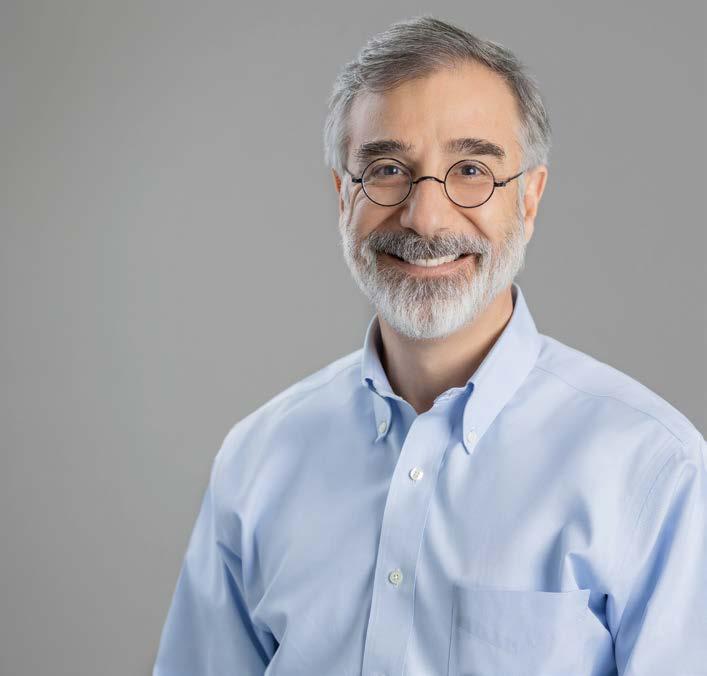
CANCER PATIENTS HAVE A SUPPRESSED IMMUNE SYSTEM FOR MANY REASONS, ONE IMPORTANT REASON IS THAT CANCER CELLS DEVELOP MANY STRATEGIES TO INHIBIT OUR IMMUNE SYSTEM SO THEY CAN DEVELOP INTO CANCER. THIS IS WHAT WE ARE TRYING TO CHANGE AND OVERCOME- SO THE IMMUNE SYSTEM WORKS AS IT SHOULD.”
addressed as you continue your journey. Every day, there is a new hurdle that arises, and you need to address and solve it. That includes the development of technologies, contracts, manufacturing, fundraising, and so on.”
}In a pleasant revelation, Dr. Khleif shares that inculcating grit and a never-say-die attitude into his entrepreneurial journey was, in fact, quite a familiar route to take up- and will continue to steer the startup’s journey in 2025 and beyond. “As scientists and physicians, we are faced with this daily- in our line of work, things don’t work the first time or
even the tenth time,” he continues.
“You must then change your hypothesis, or the way you think about the issue and be adaptable. This mindset helped me a lot in developing Georgiamune into what it has become today. When you create something from the ground up, lots of things are experimental. There are no books for this process. You could wake up and face multiple issues at once. Then you have to think out of the box and keep moving forward. Building a biotech company, and industry, is a long-term commitment and the involved investment is usually a long term one too. But it does pay back in a substantial manner!”





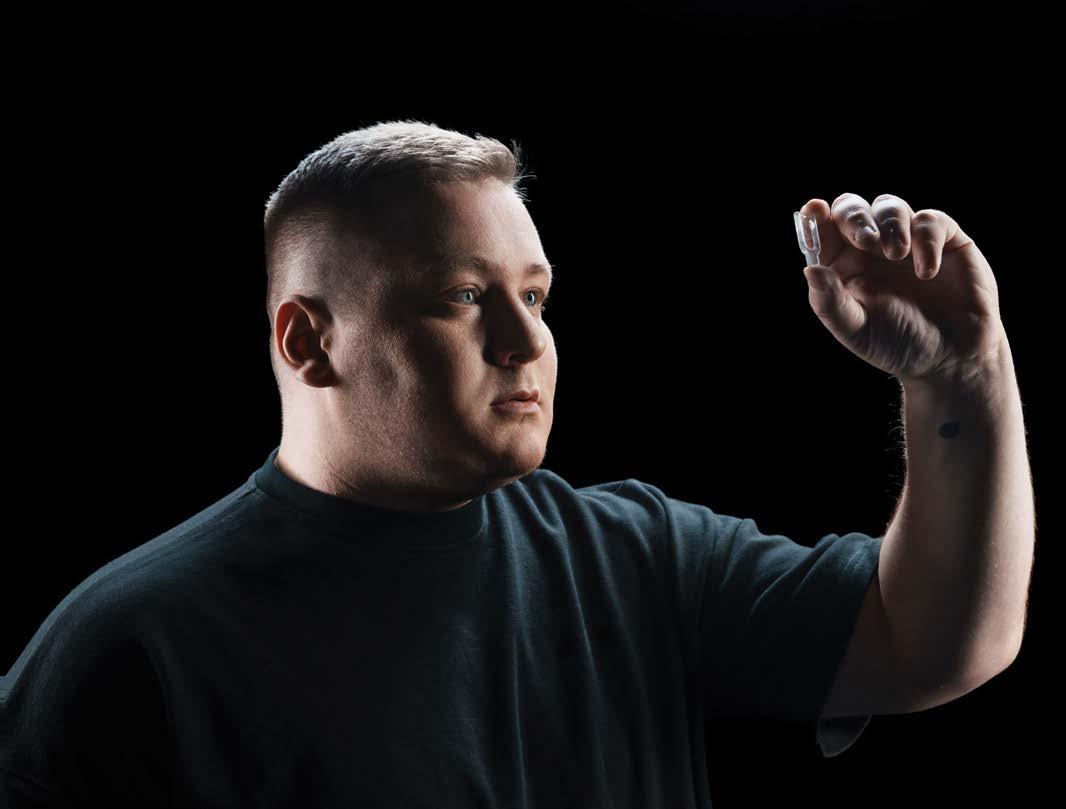
on his mission to reinvent the whole concept of human-technology
hands- Roman Axelrod is the founder of XPANCEO, Dubai-based deep technology company that aims to reinvent the whole concept of humantechnology interaction and redefine the way people experience both real and digital worlds, including social media, content consumption, and gaming. }}
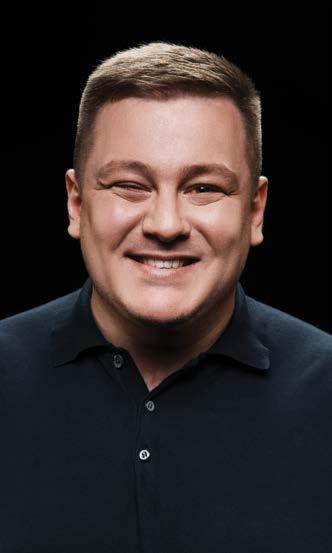
Axelrod has a proven track record of building ventures in the computer vision, esports, and fintech industries. These skills were pivotal for XPANCEO to recently secure $40 million in seed funding—the largest seed round in the Arab region and ranked 24th globally.
Entrepreneur Middle East talked with Axelrod about assembling one of the best teams of scientists, engineers, and executive leaders to create the next generation of computing out of Dubai.
Can you tell us about yourself and the beginning of your entrepreneurial journey?
Since childhood, I’ve been captivated by technology. My grandfather was one of the engineers who built the first computers, and I was fortunate
MY MOTIVATION IS REINVENTING THE NATURE OF HUMANTECHNOLOGY INTERACTIONS. I’VE ALWAYS BEEN DRIVEN BY THE IDEA THAT TECHNOLOGY CAN MAKE US HAPPIER, HEALTHIER, AND BETTER AT WHATEVER WE DO.”
enough to spend time at his lab, exploring those bulky machines. You know, my childhood practically unfolded among punch cards, so it’s no surprise that computers became my passion early on, planting the dream of one day building one myself.
As I grew older, I built successful companies across various industries. But that childhood dream of creating the next generation of computing never left me. So, when the opportunity came, I decided to go for it — and that’s how XPANCEO was born.
How did you decide to start up XPANCEO?
For years, it’s been obvious to me that the current generation of computers is completely outdated. They are fragile, bulky, and, let’s be honest, simply ugly. Even worse, they hold us back from achieving the ambitious goals humanity has set for itself: exploring space and significantly increasing human lifespans. These goals demand a technological leap, not incremental updates. For me, the next computer has always been clear — it should be AI-powered, seamlessly integrated into our surroundings, and controlled effortlessly with our minds. That vision crystallized when I was 31, during a chaotic apartment renovation. My belongings were piled up, blocking the TV, and I couldn’t even play PlayStation. Frustrated, I imagined projecting the game onto the ceiling, with WhatsApp open in one corner and Excel sprawled across the floor. That was the moment it hit me: the world needed an AI-powered XR device in a revolutionary, ultimate form factor. But for weeks, I struggled to figure
out what that form factor could be.
One late night in the office, I was stuck in the throes of creative frustration, desperately searching for answers. Exhausted both mentally and emotionally, I decided to head home. As I walked down the corridor, mindlessly scrolling through Pinterest, an image of a female astronaut caught my eye. Her vivid eyes, framed by a helmet displaying a celestial scene with orbiting planets, stopped me in my tracks. In that moment, it hit me — the device needed to be an elegant, weightless contact lens, seamlessly blending into life. Overwhelmed by the realization, I sank to the office floor and began researching obsessively. That was the true beginning of XPANCEO.
Didn’t you find this impossible: fitting the gadget into just a contact lens?
Yeah, it’s a pretty impossible task for those who try to build the next generation of technology with the current generation of technologies. Silicon-based tech, the foundation of today’s devices, was far too bulky for lenses. After deep research, I realized the answer lay in two-dimensional materials — ultralight, efficient, and perfectly suited for the task. I reached out to Dr. Valentyn Volkov, a leading scientist in this field, and asked him to join me in bringing this dream to life. At first, I’m sure he thought I was a madman with an impossible idea. But after several discussions, I managed to convince him, and together, we started the journey that became XPANCEO.
XPANCEO’s smart contact lenses are reinventing the way we interact with technology. Can you tell us more about them?
At XPANCEO, we’re redefining how
humans engage with technology, making it invisible yet essential — seamlessly blending into everyday life. Today, we rely on multiple devices; I personally use at least five each day. They all need constant charging, they’re cumbersome when combined, and they create a frustrating web of complexity. Our smart contact lenses are here to change that. Designed to merge the real and digital worlds, they enhance everyday experiences, from consuming media to managing
health. Imagine replacing your devices — smartphones, medical tools, gaming consoles — and accessing features like augmented reality, night vision, or seamless connectivity through something as weightless and natural as a standard contact lens.
These lenses free you from the constraints of traditional technology, delivering an experience so effortless it feels like it’s not even there. This is the future we’re building at XPANCEO.
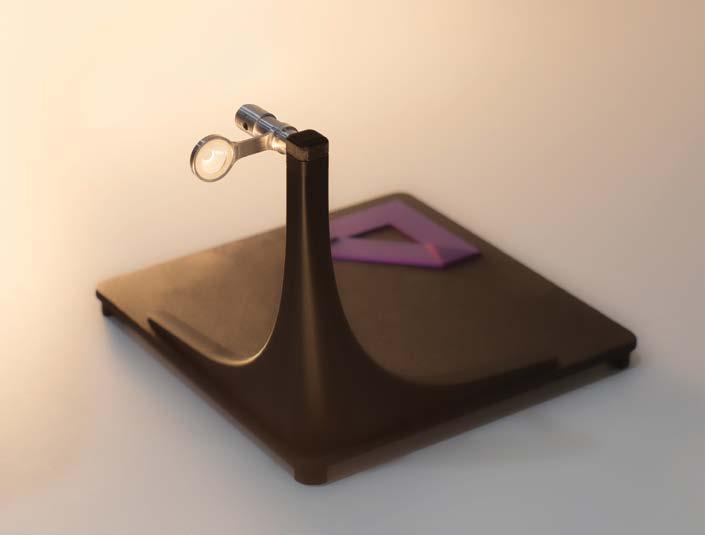
WE’RE REDEFINING HOW
What were some of the biggest challenges you faced when building XPANCEO?
The biggest challenge was the product’s technical complexity. Developing a lens that is both ultra-thin and packed with advanced features required overcoming significant scientific and engineering hurdles. We needed to ensure the lens could support every feature, all while being as lightweight and comfortable as medical contact lenses.
That said, working with extremely
talented scientists like Valentyn has helped make this possible. We have successfully pushed the frontier of scientific innovation.
Where do you see XPANCEO in the next five years?
I envision XPANCEO becoming a household name. Right now, we have lens prototypes for augmented reality (AR), night vision, zoom, health monitoring, 3D imaging, color correction, data reading, and privacy/ security. We’re working on combining these multiple functionalities into one ultra-thin, comfortable contact lens prototype, which we will achieve by the end of 2026. Over the next five years, we’re focused on two critical milestones. As a medical device, our lens requires regulatory approval, so we’re working on obtaining the necessary certifications like FDA. Simultaneously, we’re developing mass production capabilities.
As an entrepreneur, what drives you every day to pursue this mission?
My motivation is reinventing the nature of human-technology interactions. I’ve always been driven by the idea that technology can make us happier, healthier, and better at whatever we do. However, gadgets as we know them today won’t be enough to achieve the ambitious goals humanity has set for the next century. We’re in a position to set the stage for a new technological era — one in which technology, invisibly, enhances us and becomes an extension of our minds and bodies.
What role do you see the UAE playing in your future and how does this strategic location help you realize your ambitions?
The UAE is a natural fit for us. Its forward-thinking approach to science and business aligns perfectly with our mission. Dubai, in particular, is positioning itself as a global hub for technology and innovation. The potential for collaboration and growth in this region is immense.


Gadgets and doodads that you might’ve missed out on, sourced by a tech aficionado. by
TAMARA CLARKE
/Ring Battery Video Doorbell

Take your home security up a notch with the new Ring Battery Video Doorbell. It has added features, including head-to-toe HD video and seamless DIY installation. The Battery Video Doorbell also delivers up to 23 percent longer battery life than the previous model. Like all Ring doorbells and cameras,
/Logitech Pop Icon Combo


Battery Video Doorbell features motion detection with Customizable Motion Zones and real-time alerts, Live View, and the ability to talk to anyone on the other end of the door. Setting up the Battery Video Doorbell is easy. You simply download the free Ring app on iOS or Android devices, which will guide you through the setup process. You can create customizable motion zones to monitor specific spaces around your front door while ignoring unwanted areas, reducing the number of false alerts. The doorbell’s Head-to-Toe HD video ensures you have a full view of visitors and packages, while color night vision provides clear video even in the dark. For added convenience, you can use Alexa-enabled devices to check your front door by saying, “Alexa, show me the front door,” to view live footage or interact with visitors. With a Ring Protect subscription, you can also store and access recordings in the cloud, receive motion notifications with photo previews, and share clips. Recordings can be stored for up to 180 days, and for extra peace of mind, clips are erased automatically at the end of the selected storage period.
New year, new you? Don’t let work undermine your health goals. The Ninja Blast Cordless Portable Blender makes it easier for you to consume healthy beverages, even in the office. Engineered for a smooth blend, Ninja Blast Technology cuts through frozen fruit and ice, resulting in powerful, high-performance blending. It’s leak-proof sip lid and carry handle makes it perfect for the gym, work, car or even the park, allowing you to carry your blended liquids from one location to the next with ease. Ninja’s most compact and quietest blender yet, the Ninja Blast Cordless Portable Blender comes with a dishwasher-safe lid and cup, and is USB-C rechargeable.


The Pop Icon Combo, an innovative, eyecatching new keyboard and mouse pairing designed to help you boost productivity. The combo’s contoured, low-profile keyboard offers responsive, hushed, and instantly familiar typing. The devices’ fresh colors, transparent finishing, and sleek silhouette make it a perfect fit for personalizing your workspace, whether at home or in the office. Equipped with four customizable life-hack Action Keys, accessible through the free Logi Options+ app, the keyboard lets you save time and work smarter. With a single key press,
switch seamlessly from “work mode” to “break mode,” open your favorite social media, music, or video apps, or launch AI tools like Logi AI Prompt Builder. In addition, widely-used shortcuts like mute, emoji menu, and screenshot can be easily personalized to suit your workflow needs. Pop Icon Combo is compatible with multiple operating systems and devices, allowing you to type across up to three different computers, phones, or tablets with the press of a button. With up to 36 months of battery life, the keyboard offers uninterrupted productivity and reliability.
TAMARA CLARKE, a former software development professional, is the tech and lifestyle enthusiast behind The Global Gazette, one of the most active blogs in the Middle East. The Global Gazette has been welcomed and lauded by some of the most influential tech brands in the region. Clarke’s goal is to inform about technology and how it supports our lifestyles. Talk to her on Twitter @TAMARACLARKE theglobalgazette.com

From better goods to better wardrobe bests, every issue, we choose a few items that make the approved executive selection list. In this edition, our picks are from Bvlgari, Asteri Beauty, Leo Messi, and Patyka.
BULGARI OMNIA COLLECTION → Chemist Warehouse UAE
Omnia Crystalline: A light and airy fragrance, Crystalline combines botanical notes with a touch of Asian nashi, resulting in a radiant and delicate aroma suited for everyday elegance.
Omnia Amethyste: Inspired by the shimmering hues of amethyst, this fragrance captures a blend of floral and woody notes, creating a sophisticated and alluring scent perfect for those who seek a touch of luxury in their daily life.
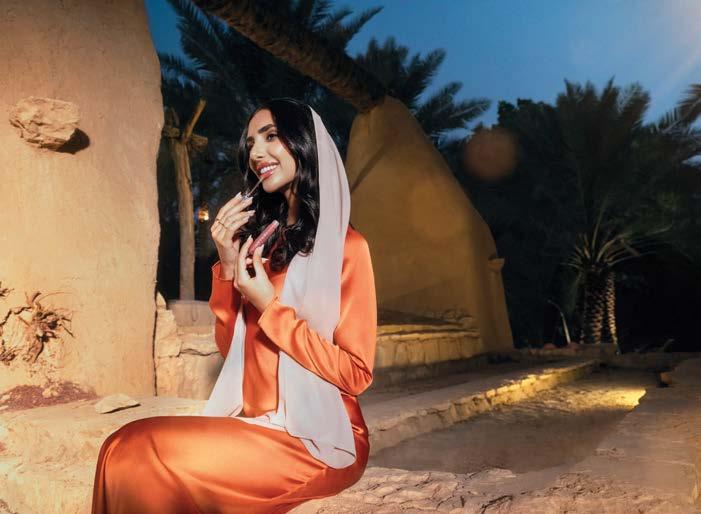
By Asteri Beauty
Sweet Oasis Sparkle, a glossy lip topper designed to bring multidimensional shine and unparalleled sparkle to every beauty lover’s routine. It is infused with shimmering, light-reflective pigments that create an intense shimmer effect, enhancing the natural beauty of the lips.
The Sweet Oasis Sparkle formula offers a fluid, silky texture that feels light and breathable, making it an essential beauty companion for day-to-night looks. Asteri Beauty believes every woman deserves a little sparkle in her life. www.asteribeauty.com
PATYKA LAUNCHES IN THE MIDDLE EAST ↓
Patyka, s Parisian premium skincare brand that is renowned for its commitment to both beauty and sustainability, is now now available at FACES and Watsons across the Middle East, as well as online. As demand for sustainable and organic skincare products rises in the Middle East, Patyka is excited to introduce its complete collection to the region. From hydrating and anti-aging to skin radiance solutions, Patyka’s hero products address diverse skincare needs while maintaining the brand’s dedication to natural, plant-based ingredients and clinically proven results. Patyka’s holistic approach to skincare provides a perfect fit for consumers seeking eco-friendly luxury and sciencebacked efficacy. www.patyka.com
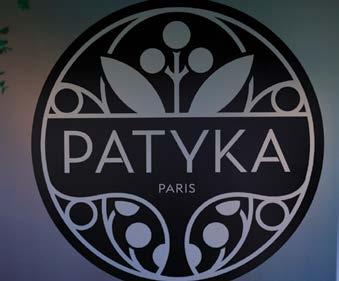
Leo Messi Eau De Parfum embodies the spirit of an icon. Crafted to reflect Messi’s unique blend of humble strength and enduring elegance, the fragrance opens with invigorating top notes of fresh cardamom, crisp apple leaf, and wild cypress. The heart reveals refined notes of French iris root, soothing lavender, and a hint of subtle leather, capturing vitality and sophistication. A rich base of Virginian cedarwood, vanilla bean, and earthy patchouli creates a lasting impression of depth. www.messifragrances.com
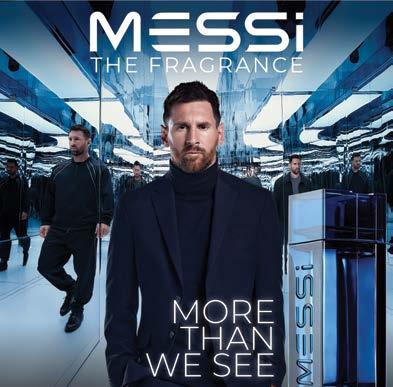

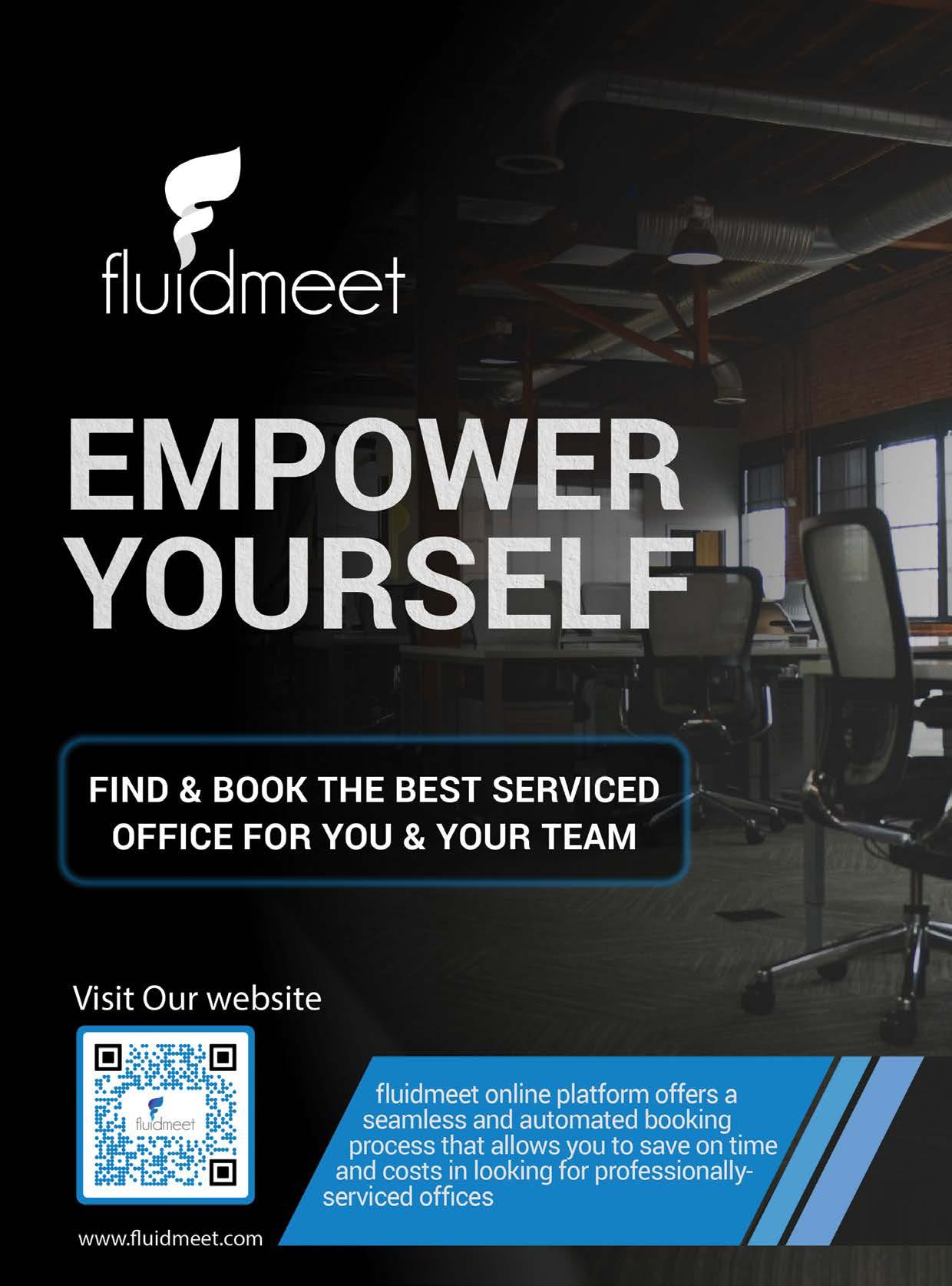
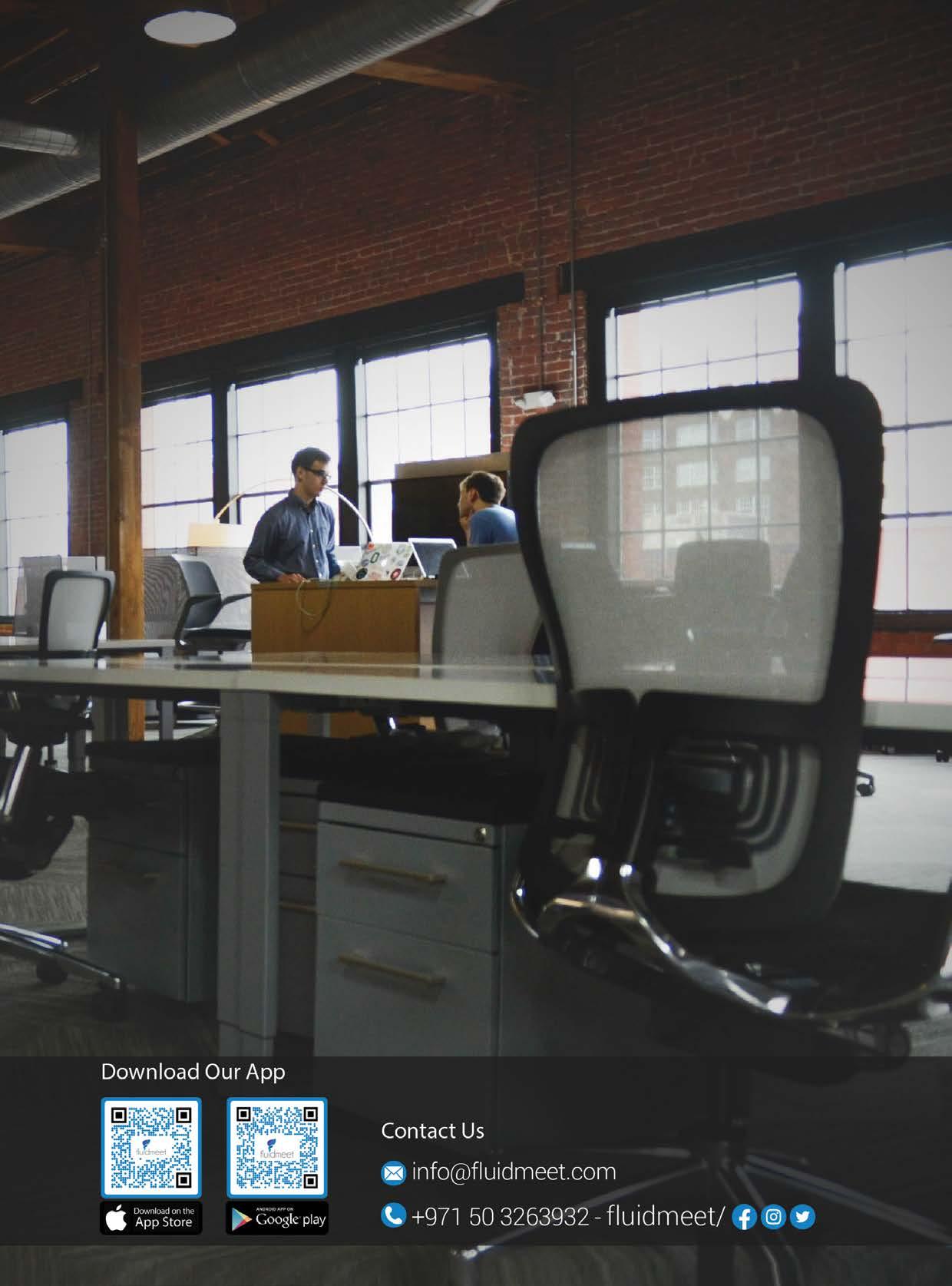
Innovating in the eGift card industry: The how-to by
HUSAIN MAKIYA
Innovation doesn’t simply emerge from a singular idea or isolated effort. No, it thrives where cultures and perspectives intersect - by blending regional expertise and global technology to create something greater than the sum of its parts.
When Apple launched the iPhone in 2007, it wasn’t just the result of one brilliant idea from a single person. It was the culmination of years of research and development across multiple fields, from
touchscreen technology to mobile computing and user interface design. The collaboration between engineers, designers, and even competitors - like the influence of early smartphone models - helped shape the iPhone into a product that changed the world.
In fact, it’s an approach we’ve seen firsthand in the Middle East’s evolving tech scene. Why? Because the intersection of global know-how and local insight is the key to fostering growth that’s both sustainable and scalable.
In the region, it all starts with building locally - once you adapt to the dynamics of an open market like the UAE, where the potential for tech innovation is enormous, this lays the foundation for you to achieve so much more. It’s not only about building a product; it’s about refining it through continuous iteration.
This is especially true in the region, where the UAE has a Digital Government Strategy for 2025 making it one of the most tech-for-

ward nations.
With that said, in the early stages, success isn’t just about gaining traction, it’s about truly understanding your market, your consumers, and how your product can evolve alongside them. Once you achieve this, you can then expand across the region.
After establishing a stronghold locally, the next step is expansion. For many, this means moving beyond borders and refining your offering to meet the diverse needs of surrounding markets.
For instance, Souq.com was able to gain strong traction in the UAE, Egypt, and Saudi Arabia by refining its platform to suit the region’s unique shopping habits and payment preferences. After establishing a foothold, Souq.com continued its regional expansion, eventually being acquired by Amazon in 2017. The company’s success lies in how it used local insights to build a strong presence before scaling across the MENA region, tapping into greater opportunities as it refined its model.
Nowadays, it’s no longer just about local success, but about capturing a regional market that’s bursting with
opportunity. This is also what we’re witnessing in the world of eGift Cards with the most notable example being giftee’s recent acquisition of a majority stake in YOUGotaGift, a leading regional eGift Card platform, a partnership that demonstrates the immense potential of merging regional expertise with Japanese technological precision to set a new bar for customer satisfaction across both local and international markets.
Scale a bit more.
As regional tech companies grow and mature, they begin to attract international interest. We’ve seen this with companies like Zawya, which was acquired by Thomson Reuters, and Careem, which was acquired by Uber. These aren’t just acquisitions for technology or market share - they’re a recognition of the teams, the vision, and the ability to execute in one of the world’s most exciting markets.
The Middle East is now being seen as a key player in the global innovation ecosystem. This shift is reflected in recent trends, such as Japan’s increasing focus on the region. For example, the Saudi Public Investment Fund (PIF) recently signed MoUs worth up to $51 billion with Japanese banks, highlighting the growing interest in partnerships that tap into the region’s, what seems like, infinite potential.
The Boeing 787 Dreamliner exemplifies cross-cultural collaboration at its finest. It involved teams from the U.S., Japan, Italy, Germany, India, France, and the UK. Each country contributed specialized expertise, such as Japan’s lightweight wings, Italy’s fuselage sections, and the UK’s Rolls-Royce engines.
Despite challenges like coordinating across time zones and aligning quality standards, the global partnership resulted in one of the most innovative and fuel-efficient airplanes in the
IN ESSENCE, CROSS-CULTURAL COLLABORATION DRIVES INNOVATION. IT ALLOWS US TO BLEND THE BEST OF BOTH WORLDSCOMBINING CUTTINGEDGE GLOBAL TECHNOLOGIES WITH INSIGHTS ROOTED DEEPLY IN LOCAL MARKETS.” “
world. This project perfectly demonstrates how diverse strengths can drive groundbreaking achievements when united by a shared goal.
The digital gift card space is no different. Amazon’s digital gift card program is a global collaboration involving partnerships tailored to local markets. In India, Amazon works with ICICI Bank and Paytm to integrate region-specific payment methods, while in Japan, it aligns with local preferences and regulatory standards. These partnerships ensure the platform simultaneously meets diverse cultural, financial, and technological needs. By leveraging expertise from various regions, Amazon delivers a seamless, globally adaptable gift card experience.
In essence, cross-cultural collaboration drives innovation. It allows us to blend the best of both worlds - combining cutting-edge global technologies with insights rooted deeply in local markets. We’re seeing the ripple effect of this with the growing number of international players who now look to the Middle East not just as a market, but as a critical hub for innovation.
The future of tech in the region will not just be about adopting what works - it will be about shaping what’s next. The integration of global technologies and the cultivation of regional insights will continue to set the stage for disruptive innovation that resonates worldwide.

Husain Makiya is a driven entrepreneur and the co-founder and CEO of YOUGotaGift, a digital gift card company based in Dubai, UAE.
He launched YOUGotaGift in 2013 with a bold mission to revolutionize the gift card experience by providing a personalized, secure and seamless digital marketplace that caters to the ever-evolving needs of consumers and businesses alike.
Under Husain’s dynamic leadership, YOUGotaGift is transforming prepaid cards to Branded Currency across gifting, incentives and payments to drive acquisition, build engagement, and increase loyalty, for businesses. With a network of 1000+ global brands, 2500+ corporates and 50+ major Loyalty programs, he is instrumental in driving the company’s exponential growth and expanding its footprint across the Middle East and North Africa region.
In addition to his work at YOUGotaGift, Husain is a passionate advocate of technology-enabled entrepreneurship. He began his entrepreneurial journey when he co-founded Zawya.com, a leading business intelligence platform, in 1999, which he managed for over a decade until its acquisition by Thomson Reuters. In 2011, he co-founded Honeybee Tech Ventures, an incubator for digital ventures, where he serves as a Partner and a board member.
Husain is an active member of the Incentive Marketing Association (IMA Europe) and the Gift Card and Voucher Association (GCVA UK). He holds an MBA and a bachelor’s degree in Civil Engineering from the prestigious Imperial College London. yougotagift.com/business

With Millennials and Gen Z living in an increasingly complex financial landscape, retirement planning has become a critical consideration. Far from the traditional safety nets of previous generations, these younger cohorts face unique challenges: rising living costs, fluctuating job markets, and the looming uncertainty of the so-called “Great Wealth Transfer.”
This is particularly true for expats in the UAE, where the lack of state pensions and employer-based retirement plans often means individuals must take financial matters into their
own hands. While the UAE’s tax-free environment provides opportunities, it also demands proactive planning.
So, how can these digital-savvy generations build a solid foundation for their future? The answers lie in balancing risk, exploring opportunities, and crafting strategies that prioritize personal goals over fleeting trends.
Here’s how to turn a daunting task into a powerful tool for financial security.
Retirement planning has never been more important for millennials and Gen Z. Financial realities are shifting dramatically, leaving little room for complacency. Rising life
expectancy and escalating healthcare costs mean younger generations will likely need more savings to maintain their standard of living in retirement than their parents or grandparents ever did.
The much-talked-about “Great Wealth Transfer” -an anticipated USD$90 trillion inheritance from baby boomers- might seem like a safety net, but it’s far from guaranteed, meaning counting on inheritance is a risky strategy for this demographic. Many baby boomers are prioritizing their own retirement needs, while longer lives and unforeseen expenses are depleting the wealth they had planned to pass down.
Instead, millennials and Gen Z have one major advantage: time. Starting early allows you to take full advantage of compounding—where your savings grow exponentially over time as your returns generate their own returns. Even modest investments made in your 20s can grow into substantial sums by the time you retire; while waiting until your 30s or 40s means you’ll need to save exponentially more each month to achieve the same result.
For expats in the UAE, retirement planning also comes with unique challenges. High living costs, transient lifestyles, and cultural pressures often lead to short-term financial mindsets. Many arrive intending to stay for only a few years, prioritiz-
THE EARLIER YOU START, THE MORE TIME YOUR MONEY HAS TO GROW. THANKS TO COMPOUND INTEREST, SMALL CONTRIBUTIONS MADE CONSISTENTLY YIELD SIGNIFICANT RESULTS.”
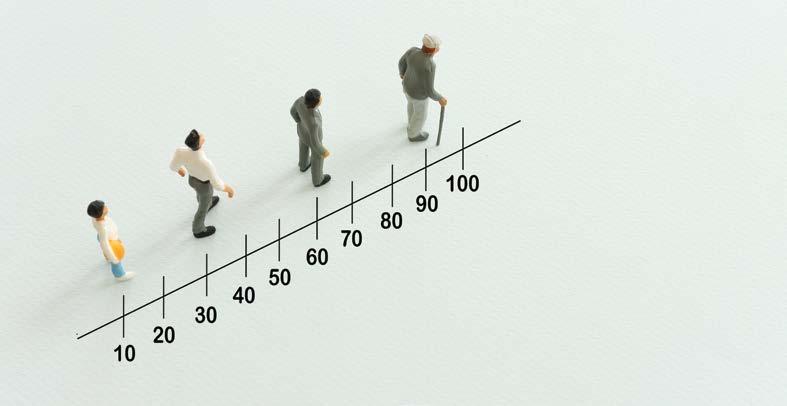
ing immediate financial needs over long-term savings.
Spending habits can be a major roadblock. Reliance on credit cards, impulsive “doom spending,” and lifestyle inflation fueled by the UAE’s luxury-driven culture can lead to mounting debt and derail savings efforts. Without clear financial goals, it’s easy to lose sight of the bigger picture.
The lack of employersponsored pensions compounds these challenges. Unlike many home countries, the UAE typically doesn’t offer structured retirement plans for expatriates, and while end-of-service gratuities provide some financial cushioning, they’re often insufficient for long-term needs. This makes it essential to create
your own retirement solutions.
The earlier you start, the more time your money has to grow. Thanks to compound interest, small contributions made consistently yield significant results. For example, saving AED 1,000 a month starting at age 25 could grow into AED 1.5 million by age 65, assuming a 7% annual return. Starting at 35 would require nearly double the monthly contribution to achieve the same result.
Aim to save 10–15% of your income. Even smaller amounts make a difference. Automating savings into retirement accounts or investment funds helps
ensure consistency without relying on willpower.
} Diversify investments
A diversified portfolio is key to managing risk while growing wealth. Spread investments across asset classes, such as real estate, equities, ETFs, and fixed income. Global ETFs, which track international stocks or bonds, are a great starting point, offering broad exposure and reduced risk.
As your financial situation evolves, consider expanding into other areas like real estate or specific industries to further diversify.
} Balance risk and opportunity
While high-risk investments like cryptocurrencies can be tempting, they’re often volatile. Base

decisions on research and long-term potential, not fleeting trends. A financial advisor can tailor your strategy to your goals and risk tolerance, balancing stability and growth.
} Protect against inflation
Inflation erodes purchasing power over time, making inflation-proof strategies essential. Investments like real estate or index-linked funds that adjust to inflation rates safeguard your money’s value.
With these strategies, you can build a resilient retirement plan that grows with you and withstands the test of time.
The Golden Pension Scheme: Investing in your future
The Golden Pension Scheme enables expats to turn end-of-service gratuities into structured retirement plans. By reinvesting gratuities and adding monthly savings, you can harness the power of compounding to grow your fund steadily.
} Real estate: a strategic move, not just a dream
Property investment can also be a great strategy, particularly in the UAE with its absence of property taxes, no capital gains tax and high rental yields, real
estate offers an opportunity to build wealth. Younger generations can view property as an appreciating asset or a source of passive income. If purchasing seems out of reach, consider co-ownership or pooling resources with family.
} Leveraging the UAE’s tax-free advantage
The UAE’s tax-free environment allows you to maximize savings. Unlike countries where income and investment returns are heavily taxed, every dirham saved and invested here works entirely in your favor. You can use this to your advantage by diversifying into global ETFs, high-yield bonds, or sustainable investments.
} Beyond borders: the retirement visa and long-term stability
For those planning to stay in the UAE, the retirement visa offers security. Meeting savings or property ownership criteria early can align current investments with future residency goals.
} Estate planning: avoiding international pitfalls
Expats often face conflicting inheritance laws across jurisdictions. A
well-drafted will is essential. Tools like DIFC and ADGM wills help ensure assets are distributed according to your wishes, bypassing local Sharia inheritance laws.
} Double Taxation Agreements: protecting your investments
Double taxation agreements (DTAs) help reduce or eliminate duplicate tax liabilities. The UAE has signed DTAs with many countries, which ensure you optimize your investment returns and compliance.
} Pensions and compliance: a balancing act
It’s important to align foreign pension plans you might already have with local regulations so that you avoid the potential for penalties or restricted access. If you’re uncertain of the interplay between international regulations and local compliance requirements, professional advice can be invaluable here.
The path to financial security begins with clear goals. Tools like the 4% rule, which suggests withdrawing 4% of your savings annually in retirement, can help calculate how much you’ll need. This creates a roadmap for your savings and investment strategy.
Budgeting is the next step. Redirecting non-essential expenses toward a retirement fund might seem small, but these contributions grow significantly over time. Professional financial advisors can provide tailored guidance, ensuring your investments and strategies align with your goals and risk tolerance.
Millennials and Gen Z have an opportunity to reshape the narrative around retirement planning. By taking deliberate steps today, you can build not just financial stability but a future that reflects your ambitions and priorities. Now is the time to act.

Sophia Bhatti is the founder and CEO of Wimbledon Wealth. wimbledonwealth.com
A look at how to thrive within a hybrid economy by developing one’s adaptability quotient, emotional intelligence, creativity, and digital literacy. by
DR. ELIE DAHER
In an era marked by exponential disruption, the economic landscape has transformed into a hybrid model where the traditional knowledge economy converges with the burgeoning creator economy. Knowledge and information are more accessible than ever, challenging the value of purely knowledge-based roles.
In this article, we will explore the evolution of leadership and examine how younger genera -
The requirements for effective leadership are constantly evolving, mirroring the shifts in how we work and what society values. For hundreds of
tions, professionals, and leaders can thrive within this hybrid economy by developing key traits: adaptability quotient (AQ), emotional intelligence (EQ), creativity, and digital literacy. It also emphasizes the importance of balancing digital transformation with the human element, offering actionable insights on how to differentiate oneself and embrace AI as an enabler rather than a replacement for human potential.
years, humanity operated within agrarian societies, where leadership was rooted in community, resource management, and social hierarchy. Leaders were family heads, responsible for nurturing,


UNLIKE THE KNOWLEDGE ECONOMY, WHICH VALUES EXPERTISE AND UNIFORMITY, THE CREATOR ECONOMY REWARDS UNIQUENESS AND EMOTIONAL CONNECTION. IN THIS SPACE, CREATORS WHO BLEND AI WITH AUTHENTICITY TO ENHANCE THEIR UNIQUENESS STAND OUT.”
unifying, and ensuring the survival of their communities. Their leadership was valued based on their ability to sustain the land and the community across generations.
The mid-1700s brought about the Industrial Revolution, a time when societies became more urban and mechanized. This era introduced a need for efficiency and strict hierarchy. Leaders, often factory managers, were authoritarian, focused on organization and productivity, and saw workers as cogs in a machine. The modern schooling system, structured to create obedient, uniform workers, emerged to support this industrial need. With the dawn of the Information Age in the mid-20th century, leadership underwent a radical shift. The knowledge economy valued intellectual capital, and leadership
became less authoritarian. Leaders were now mentors and coaches, with access to real-time data that allowed for a more flexible, supportive style of management. As workers became more skilled, there was a growing emphasis on the human factor in productivity, laying the foundation for the development of emotional intelligence in leadership.
Today, we are witnessing the rise of the Creator Economy, a new reality where creativity, adaptability, and individual expression drive value. This era is not simply a departure from the knowledge economy but an evolution that combines knowledge, creativity, and technology. With the advent of generative AI, we’re moving into a hybrid economic model where both the creator and knowledge economies coexist. To thrive, leaders, professionals, and
young adults must now harness uniquely human skills that machines cannot replicate.
Human work has evolved through stages—physical quotient (PQ) in agrarian societies, intellectual quotient (IQ) during the industrial and knowledge economies, and now adaptability quotient (AQ) as we enter a hybrid world where AI and digital technology redefine roles. Ross Thornley, co-founder of AQAI, emphasizes that adaptability is now the linchpin of success. As machines replace physical tasks and AI takes over complex cognitive work, those with high AQ who can pivot and learn continuously are positioned to thrive, while those anchored in static knowledge roles face obsolescence.
The knowledge economy, fueled by intellectual capital and specialized skills, dominated the late 20th century. Doctors, lawyers, and financial advisors relied on extensive knowledge and training to succeed. However, AI has begun to commoditize knowledge, automating tasks such as diagnostics, legal research, and data processing.
Today, professionals in the knowledge economy must integrate AI tools to enhance their roles. For example, doctors who use AI in diagnostics or lawyers who employ legal research AI are enhancing their impact rather than replacing their expertise.
The creator economy, driven by platforms like YouTube, TikTok, and Substack, allows individuals to monetize their creativity and personal brand, bypassing traditional structures. Unlike the knowledge economy, which values expertise and uniformity, the creator economy rewards uniqueness and emotional connection. In this space, creators who blend AI with authenticity to enhance their uniqueness stand out.
For example, while AI can assist in content creation, it cannot replicate an individual’s unique storytelling style, humor, or empathy. This economy emphasizes emotional intelligence (EQ) and creativity as key differentiators, placing value on how individuals connect with their audience and inspire engagement.
} 1/ Young generations: Building careers in an unpredictable landscape
Young adults entering the workforce face a landscape where linear career paths are fading, and rapid technological changes demand continuous learning. To succeed, they must develop AQ, enabling them to pivot
easily in response to change. Alongside AQ, emotional intelligence (EQ) will be crucial for forming connections in increasingly virtual workplaces, while creativity will help them stand out as unique contributors. Embracing lifelong learning will equip them with the resilience needed to navigate unpredictable shifts.
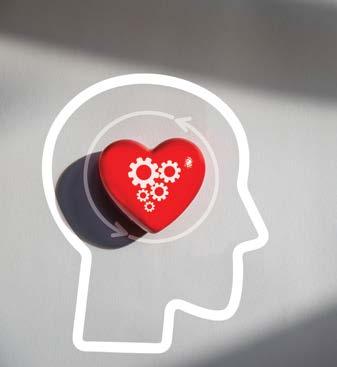
For knowledge-based professionals — doctors, lawyers, financial advisors— the creator economy presents both opportunities and challenges. As AI handles diagnostic, research, and analytic tasks, relying solely on specialized knowledge is no longer sufficient. Professionals must transcend pure knowledge work, focusing on human skills like creativity, adaptability, and empathy, which AI cannot replicate. Embracing AI as a tool rather than a replacement allows these professionals to enhance their roles and deliver uniquely human value in client interactions.
3
Leaders today are tasked with navigating technological transformation and fostering a culture of adaptability. To thrive in the hybrid economy, leaders must model emotional intelligence and creativity, encouraging teams to
see AI as an asset. Agile leadership, promoting lifelong learning, and fostering resilience are crucial for building future-ready teams. Leaders must prioritize human-centric strategies, ensuring that AI enhances —rather than diminishes— the unique value of their teams. This approach fosters innovation, reinforces trust, and grounds organizations in stability.
The future leader of 2030 will not view technology as a replacement but as an enabler of human potential. Ultimately, professionals, young adults, and leaders must embrace a future driven by adaptability, creativity, emotional intelligence, and digital literacy. Those who blend technological proficiency with these human skills will thrive, transforming disruption into growth and innovation. In this age of exponential change, the ideal leader of 2030 will foster a resilient, human-centered workforce that brings out the best in technology while staying grounded in timeless human qualities.

Dr. Elie Daher is an accomplished author, executive coach, and senior leader with over 38 years of experience guiding organizations toward growth, innovation, and high performance. With extensive expertise in overseeing strategic business management and leading global marketing initiatives, Dr. Daher has been instrumental in driving transformative results across diverse industries. As a founding board member of Marshall Goldsmith Stakeholder Centered Coaching - Middle East, he contributes to delivering powerful, measurable leadership development solutions that empower executives and teams.
His excellence in leadership philosophy centers on cultivating long-term habits that foster effective, adaptive, and impactful leadership. Dr. Daher’s passion lies in inspiring leaders to unlock their full potential and achieve sustained excellence in an ever-evolving professional landscape.

by MARTIN KUBLER
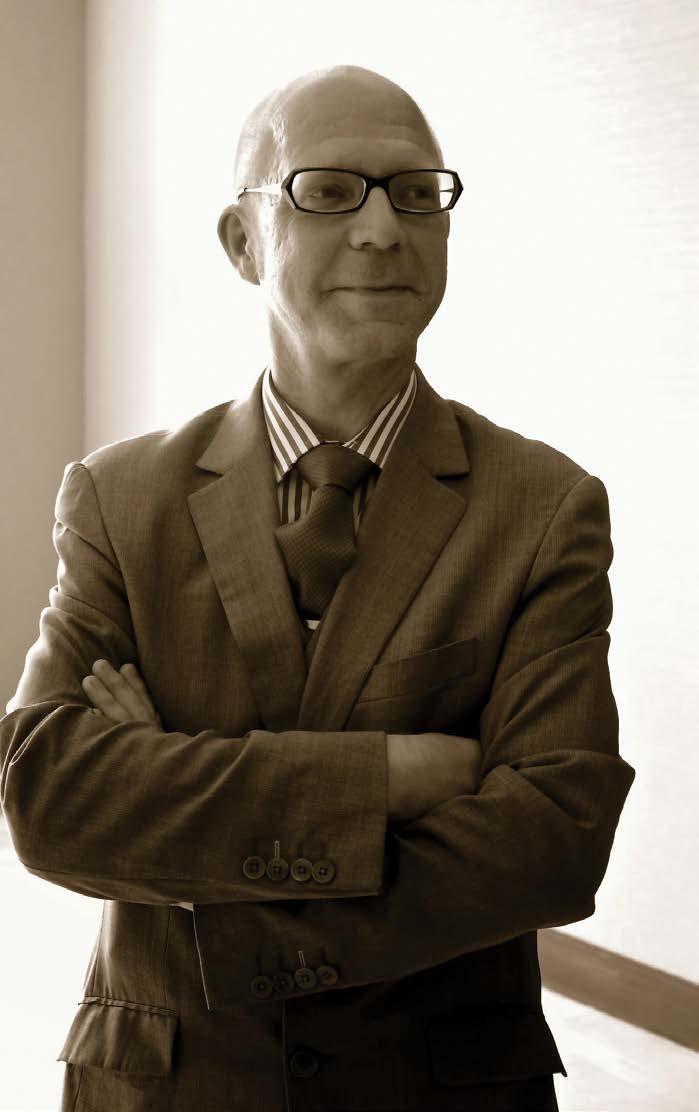
Our industry is often said to not be very innovationfriendly and news of non-tech hospitality start-ups is somewhat rare. It’s not that there is a complete absence of innovation – it’s more that it’s incremental rather than abrupt. In other words, we’re more likely to make a hotel room more comfortable, than come up with an entirely new room altogether.
For some years, I’ve worn both a hospitality and a start-up head, but rarely do these two snuggly fit together. The end of November, though, was one of these rare times, when they did and I had the pleasure of attending the second edition of a hospitality, travel, and luxury start-up battle in Switzerland.
Unlike the first edition earlier this year, this one featured more hospitality start-ups and it was great listening to the pitches. Technology was, of course, the centre of some of them, such as Du-bai-based Gourmet Hub’s pitch, which promoted a cutting-edge digital marketplace for meal plans. Think of it as a food delivery platform, but purely for meal plan subscriptions with plans to branch out into other subscriptionbased offerings such as juices and health supplements. It was a gutsy pitch but didn’t win.
What did win, though, was Poynto – a start-up that quite literally reinvents hotel rooms. Not super drastically – it’s hospitality after all – but enough to capture the interest of the judges.
Poynto takes the concept of Japanese capsule hotels but makes them a little less claustrophobic and more social. Purpose-build capsules, complete with work areas and double beds, can be slotted into ex-isting structures – think office buildings, co-working spaces, or even an entire hotel floor. Digitally enabled, budgetfriendly (but not cheap), and geared towards digital nomads, I can see this pop-ping up in the UAE before too long.
Another start-up with connections to and, indeed, roots in the Middle East, which created buzz, was Fil Foods – a group of London and Amsterdam-based Palestinian brothers and friends, who have set out to give Shatta, a traditional Palestinian chili condiment, a modern look & feel and in-troduce it to the world. With eye-catching design, a clean label, and in different spice levels, this is a product that I felt could well be the next siracha or breakfast must-have. I managed to get my hands on a jar and, a day later with Chef friends in Milan, we used it as a topping to a ramen dish – it worked a treat.
Personally, I particularly enjoy start-ups that set about solving “everyday” issues our industry en-counters. You know, nothing outsiders might ever think about, but things that many of us look at and go “I wish there was a better way”. As such, I rooted for SuperJuices, a Geneva-based start-up, that has come up with a way to bottle fresh lemon and lime juice and give them a four-month shelf-life – all without pasteurising or otherwise chemically treating the ingredients. If you run a bar, you’ll see the innovation here. They also created a substitute for egg whites in cocktails and mocktails, which is plant-based and has an equally long shelf life. Yes, it’s nerdy, but these are solu-tions that help bars, hotels, and restaurants save time and money.
PERSONALLY, I PARTICULARLY ENJOY START-UPS THAT SET ABOUT SOLVING “EVERYDAY” ISSUES OUR INDUSTRY EN-COUNTERS. YOU KNOW, NOTHING OUTSIDERS MIGHT EVER THINK ABOUT, BUT THINGS THAT MANY OF US LOOK AT AND GO “I WISH THERE WAS A BETTER WAY”.

An idea which - while perhaps not suitable for the Middle Eastern market – might attract invest-ment from the Middle East, was the Italian start-up Monte Senior. By now, we’ve all heard of vil-lages and towns in Italy selling abandoned buildings for a couple of dollars – Monte Senior targets just such villages and plans to buy up enough structures at a bargain price to create Italy’s first inte-grated senior living community – it’s a straightforward idea, which makes a lot of sense and could help to revive villages and regions, that have been left sparsely populated by an outflow of young-er folks.
An idea that will certainly appeal to HNWs and UHNWIs (i.e. people with a lot of money) was Iden, a French start-up creating luxury retreats in spectacular locations. In the end, it wasn’t really about who won or even who took part in the event, but about the ex-istence of the event itself and the fact that most of
the start-ups were driven by young, energetic, recent graduates. If we can create more think tanks and start-up accelerators for ideas in our in-dustry, we’ll benefit immensely in the long run and provide additional ways for younger folks to get involved in our world – not just as employees, but as entrepreneurs, founders, disruptors, and value creators.
Doing this requires that we start looking beyond the edge of our own plate, as we say in Germany, and embrace ideas and people that don’t neatly fit into the boxes of traditional company-employee or companysupplier relationships. I’m fairly certain that this could be a lucrative under-taking – profits all too often lie outside established boxes.
Martin Kubler is the Chief Sloth at The Gluttonous Sloth, a Sweden-headquartered business, marketing, and PR consulting, coaching, and training firm. martinkubler.com



